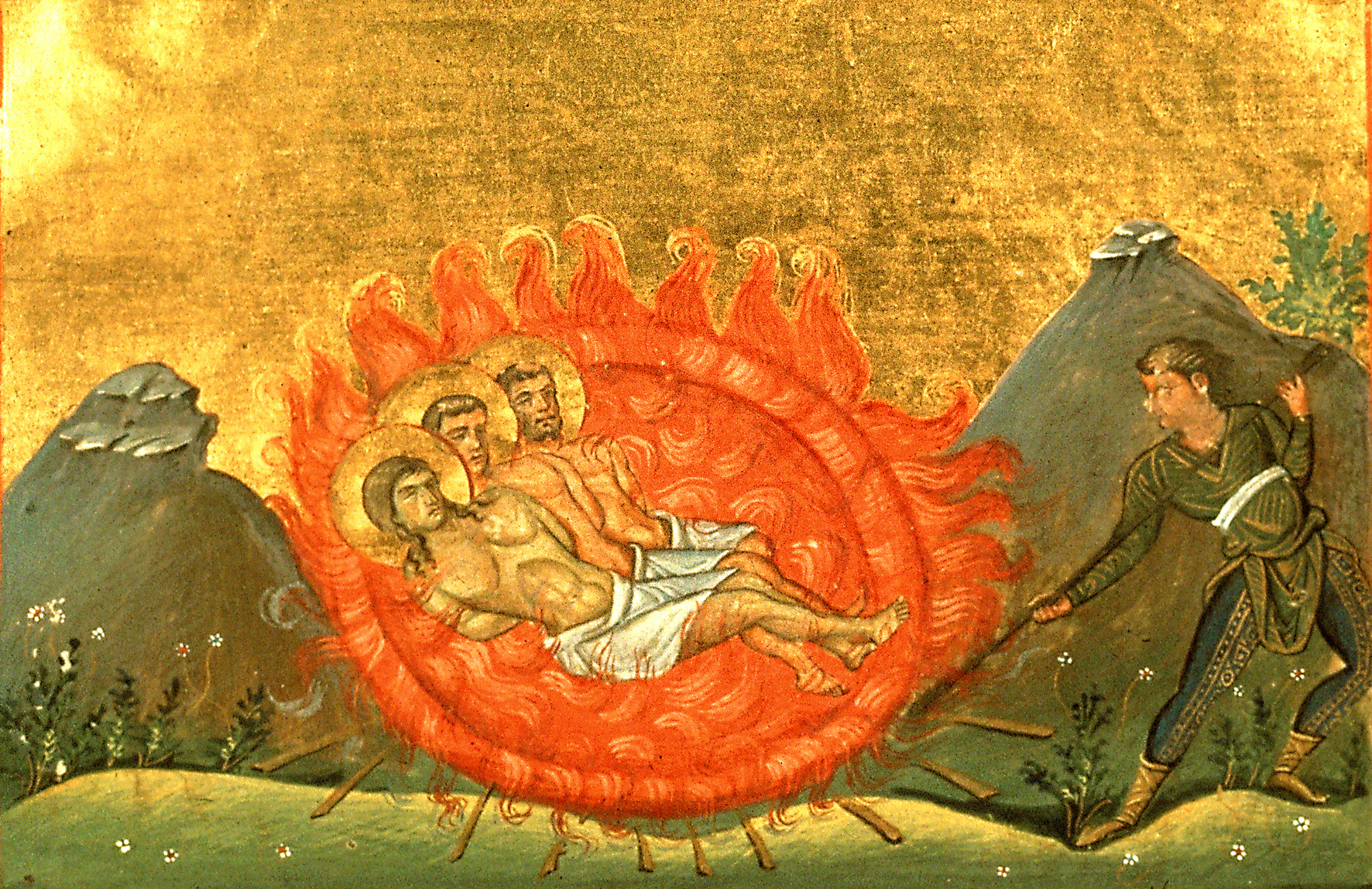
By Niketas Chonates from O City of Byzantium
SOLON, the best of the Athenians, viewed the revolution of Peisistratos as deluded and frequently lectured the Athenians in an attempt to quench the tyranny. He realized full well that it is easier to eradicate an emerging evil in the very beginning and thus prevent its taking root than to cut it away and destroy it after it has grown and become strong. When no one paid heed and he was unable to convince anyone, he carried weapons in his arms and deposited them at the entranceways in the hope that in this way he would arouse and incite certain of the citizens to emulate him in his zeal. As no one was prompted to do so, or even joined in urging the tyrant's overthrow, he is reported to have said, "I have defended the fatherland as best I could," and thereafter he held his peace, composing poems and taunting the Athenians for their irresolution. One of these writings, which has not been swept away by the flow of time, reads as follows:
If you now suffer, do not blame the Powers,
For they are good, and all the fault was ours.
All the strongholds you put into his hands,
And now his slaves must do what he commands.
If Solon, the scion of Kodros,1586 whose reputation for wisdom has spread almost to the four corners of the earth, put the assembly to shame by word and deed, he did so in vain. The same would have been true had a member of our own generation attempted to come to the aid of the state whose emperors, from the beginning, were nurtured in indolence, who snored in slumber more sweet than Endymion's and came ever earlier to dinner; so secluded were they from state affairs that they were wholly given over to such trivialities as demanding flowers in wintertime and fruit in the spring. The citizens, on the other hand, were concerned only with the business of commerce and driving a trade; they neither rose from their beds at the sound of the war trumpets nor were they awakened by the singing of birds, but slept soundly without any knowledge of warfare.
While the majestic Solon composed poems and upbraided those who had erred, it seems that the assembly of the Athenians, with itching ears, acquiesced to the edifying arguments advanced by the best men. It is possible to reproach docile men in other ways, by mixing the sweet with the bitter. And memory, like a fan that kindles the surviving embers of the good fire buried in the soul into a bright flame, cautions against committing the same error in similar circumstances. As for us, the inhabitants of Constantinople, as well as for those in the provinces, the reproaches were bruises in themselves. The horror of pierced ears had not entered the minds of the masses, nor had they been cognizant of the goddess of freedom, the Paphian [Aphrodite], just as those who have never tasted of honey can never know honey's sweetness.
But since our times are in variance with the age of Solon, let us overlook the ox-goads of reproach, for they will contribute only to the majority being unequally yoked together (for they are like dangerous bulls whose horns are bound with hay), and let us continue with the subsequent events of our history. If we refuse to sing the deeds of the barbarians, yet [God] will take the wise in their own cleverness;"' he will often cause the proud to fall and fill their faces with dishonor and deliver them to nations more barbarous than themselves, to their ruin. It behooves us not to remain silent to the very end but to cite the written word in testimony of the wonderful works of God, who says, "I live forever and will render vengeance to mine enemies and utter destruction to them that hate me. And again he says to Abraham, "And the nation, whomsoever they shall serve, I will judge."
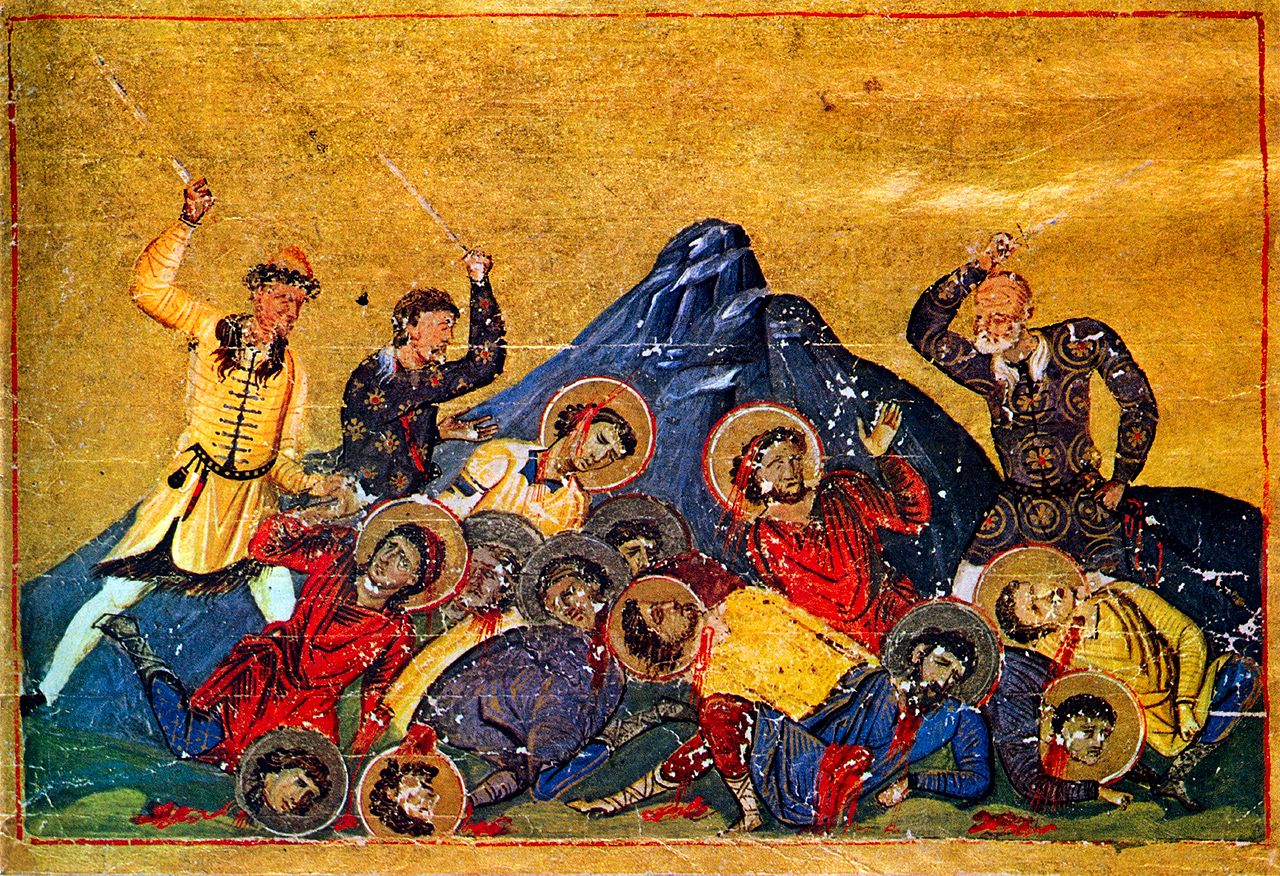 Thus it was that Constantine's fair city, the common delight and boast of all nations, was laid waste by fire and blackened by soot, taken and emptied of all wealth, public and private, as well as that which was consecrated to God by the scattered nations of the West. Feeble and unspeakable, these assembled to undertake a voyage of piracy, and their pretext to backwater against us, like a painted mask concealing their true motives, was to avenge Isaakios Angelos; as their best and most precious cargo they carried the son he had unfortunately begotten to the ruin of our country. The supine and stay-at-home ministers of the Roman empire ushered in the pirates as judges to condemn and punish us.
Thus it was that Constantine's fair city, the common delight and boast of all nations, was laid waste by fire and blackened by soot, taken and emptied of all wealth, public and private, as well as that which was consecrated to God by the scattered nations of the West. Feeble and unspeakable, these assembled to undertake a voyage of piracy, and their pretext to backwater against us, like a painted mask concealing their true motives, was to avenge Isaakios Angelos; as their best and most precious cargo they carried the son he had unfortunately begotten to the ruin of our country. The supine and stay-at-home ministers of the Roman empire ushered in the pirates as judges to condemn and punish us.
As for the fate which befell the queen of cities, neither celestial nor terrestrial sign was given, as happened often in the past, portending the calamities of mankind and the pernicious attacks of evils. Bloody raindrops did not pour down from heaven, nor did the harvest turn blood red, nor did fiery stones fall out of the sky, nor was anything new observed; but many-legged and many-handed Justice appeared without the sound of footfall or handclap as a zealous avenger, fell silently and inaudibly upon the City, and made of us the most ill-starred of men.
On that day on which the City fell [13 April 1204], the despoilers took up quarters in the houses spread out in all directions, seized everything inside as plunder, and interrogated their owners as to the whereabouts of their hidden treasures, beating some, holding gentle converse with many, and using threats against all. Taking possession of these things, they put them on display, both those furnishings that were in plain view and which were brought forward by their owners and those valuables which they found themselves after prolonged searching. They spared nothing and shared none of the belongings with their owners, nor were they willing to share food and house with them; and because they showed them utter disdain and refused to mingle with them, taking them captive while heaping abuse upon them and casting them out, the chiefs decided to allow those who so desired to depart from the City. Gathered into groups, they went forth wrapped in tatters, wasted away from fasting, ashen in complexion, their visages corpse-like, and their eyes bloodshot, shedding more blood than tears. Some made their possessions the subject of lamentation, while others said nothing as though the loss of their belongings were a matter of no distress whatsoever; some bemoaned the abduction and deflowering of a beautiful young daughter of marriageable age or bewailed the loss of a spouse, while others moaned some other calamity as they made their way.
My own situation in the course of events was as follows. On that truly hateful day of evil name, many of my close friends flocked to my house whose entranceway, dark and difficult to approach, was covered by a low portico; our residence in the district of Sphorakion, incomparable in beauty and immense in size, was destroyed by the second fire. It was, moreover, convenient from here to enter the Great Church, as it was situated near the temple precincts. But there was no place left unsearched by the troops, nor could any sacred place offer asylum and protect the refugee from harm. No matter in what direction one fled, one was dragged away by the enemy and carried off to a location of their own choosing. Beholding these lawless acts visited upon us in these present circumstances, we pursued that which was expedient.
There was a certain acquaintance of mine who shared my hearth with me, a Venetian by birth, who was deemed worthy of protection, and with him, his household and wife were preserved from physical harm. He proved to be helpful to us in those troubled times. Putting on his armor and transforming himself from merchant to soldier, he pretended to be a companion in arms and, speaking to them in their own barbaric tongue, claimed that he had occupied the dwelling first. Thus he beat off the despoilers to a man. But they continued to pour in in large numbers, and he despaired of opposing them, especially the French, who were not like the others in temperament or physique and boasted that the only thing they feared was heaven. As it was impossible for him to fall upon them, he enjoined us to depart so that we men should not be put in chains because of our money, and the women should not be violated and wantonly raped.
This good and former household servant and client now became our brave helpmate, providing us protection in these anxious times. After he had taken us to another house where Venetian acquaintances of oursresided, we left a short time later, dragged away by the hand as though we had been allotted to him as captives of his spear, and downcast and ill-clad we were sent on our way. Because this part of the City had fallen to the French, we became immigrants once again. When our servants dispersed in all directions, inhumanly abandoning us, we were compelled to carry on our shoulders the children who could not yet walk and to hold in our arms a male infant at breast, and thus to make our way through the streets.
Having remained in the City for five days after her fall, we departed [17 April 1204]. The day was Saturday, and what had taken place was not, I believe, an event without meaning, a fortuitous circumstance or a coincidence, but the will of God. It was a stormy and wintry day, and my wife was approaching the throes of childbirth, so that Christ's prophecy, "Pray ye that your flight be not in the winter, neither on the sabbath day," and "Woe unto them that are with child in those days!i1599 appeared to have been spoken for us, and to have been wholly fulfilled. Numerous friends and relatives and a multitude of others, on seeing us, came running to escort us on our way, and we were like a throng of ants passing through the streets. The troops who came out to meet us could not be called armed for battle, for although their long swords hung down alongside their horses, and they bore daggers in their sword belts, some were loaded down with spoils and others searched the captives who were passing through to see if they had wrapped a splendid garment inside a torn tunic or hidden silver or gold in their bosoms. Still others looked with steadfast and fixed gaze upon those women who were of extraordinary beauty with intent to seize them forthwith and ravish them. Fearing for the women, we put them in the middle as though in a sheepfold and instructed the young girls to rub their faces with mud to conceal the blush of their cheeks so that they should not, like a beacon's fire in the night, signal wayfarers who would first become spectators, then admirers, and finally rapists, viewing their own pleasure as guiltless. We lifted our hands in supplication to God, smote upon our breasts with contrite hearts, and bathed our eyes in tears and prayed that we all, both men and women, should escape those savage beasts of prey unharmed. It was necessary that we pass through the Golden Gate.
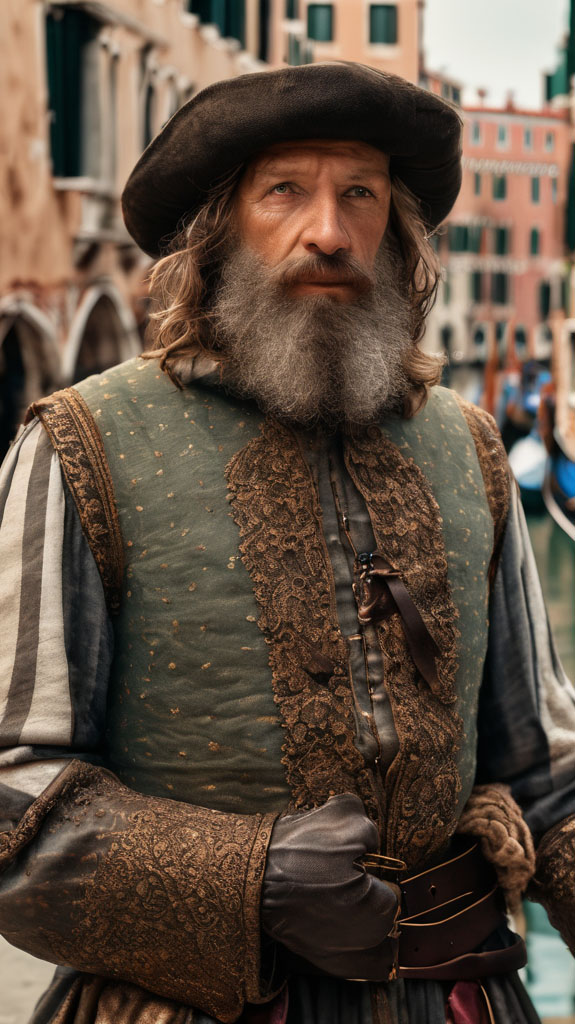 As we came to the Church of the Noble Martyr Mokios, a lecherous and unholy barbarian, like a wolf pursuing a lamb, snatched from our midst a fair-tressed maiden, the young daughter of a judge. Before this most piteous spectacle our entire company shouted out in alarm. The girl's father, afflicted by old age and sickness, stumbled, fell into a mud- hole, and lay on his side wailing and wallowing in the mire; turning to me in utter helplessness and calling me by name, he entreated that I do everything possible to free his daughter. I immediately turned back and set out after the abductor, following his tracks; in tears I cried out against the abduction, and with gestures of supplication I prevailed upon those passing troops who were not wholly ignorant of our language to come to my aid, and I even held on to some with my hand. In this way I succeeded in moving some to pity and convinced them to go in pursuit of that shameless fleshpot.
As we came to the Church of the Noble Martyr Mokios, a lecherous and unholy barbarian, like a wolf pursuing a lamb, snatched from our midst a fair-tressed maiden, the young daughter of a judge. Before this most piteous spectacle our entire company shouted out in alarm. The girl's father, afflicted by old age and sickness, stumbled, fell into a mud- hole, and lay on his side wailing and wallowing in the mire; turning to me in utter helplessness and calling me by name, he entreated that I do everything possible to free his daughter. I immediately turned back and set out after the abductor, following his tracks; in tears I cried out against the abduction, and with gestures of supplication I prevailed upon those passing troops who were not wholly ignorant of our language to come to my aid, and I even held on to some with my hand. In this way I succeeded in moving some to pity and convinced them to go in pursuit of that shameless fleshpot.
I went on ahead and the others followed. When we arrived at the lodgings of this lover of women, he sent the girl inside and stood at the gateway to repulse his opponents. Pointing my finger at him, I said, "This is he to whose wrongdoing the light of day bears witness, and who disregards the commands of your wellborn chiefs. You have decreed and have sworn the most awesome oaths to refrain from intercourse with, and, if possible, from even casting an adulterous eye on, married women, maidens who have never known any man, and nuns consecrated to God. This man has flouted your injunctions before many witnesses and was not afraid to bray like a salacious ass at the sight of chaste maidens. Defend, therefore, those who are protected by your laws and who have been put in our charge; be softened by these tears which God does accept and which nature has channeled into our eyes so as to arouse pity for one another. If you have fathered sons and daughters, we entreat you, by your wives and beloved children, to extend a hand to your suppliants, and above all, by the God-receiving tomb that received God and by the precepts of Christ which enjoin upon all those who have been called by him in common to do unto men whatsoever they would that they should do to them.
With such arguments, I aroused the sympathies of these men, and they insisted on the girl's release. At first, the barbarian showed contempt, as he was held captive by the two most tyrannical of passions, lust and wrath. When he saw, however, that the men were bristled with anger and proposed to hang him from a stake as an unjust and shameless man, and that their threats came not from their lips only but from their hearts as well, he yielded reluctantly and surrendered the girl. The father rejoiced at the sight of his daughter, shedding tears as libations to God for having saved her from this union without marriage crowns and bridal songs. Then he rose to his feet and continued on the way with us.
As we left the City behind, others returned, thanks to God, and loudly bewailed their misfortunes, but I threw myself, just as I was, on the ground and reproached the walls both because they alone were insensible, neither shedding tears nor lying in ruins upon the earth, and because they still stood upright. "If those things for whose protection you were erected no longer exist, being utterly destroyed by fire and war, for what purpose do you still stand? And what will you protect hereafter unless you strive to bring destruction to the enemy in the day of wrath, when the Lord shall rise up to strike terribly those who have dealt with us in such fashion, riding perhaps on the West, according to David's prophecy? "0 imperial City," I cried out, City fortified, City of the great king, tabernacle of the most High, praise and song of his servants and beloved refuge for strangers, queen of the queens of cities, song of songs and splendor of splendors, and the rarest vision of the rare wonders of the world, who is it that has torn us away from thee like darling children from their adoring mother? What shall become of us? Whither shall we go? What consolation shall we find in our nakedness, torn from thy bosom as from a mother's womb? When shall we look upon thee, not as thou now art, a plain of desolation and a valley of weeping, trampled by armies and despised and rejected, but exalted and restored, revered by those who humbled thee and provoked thee, and once again sucking the milk of the Gentiles and eating the wealth of kings? When shall we doff these shriveled and tattered rags which, like fig leaves and garments of skins, suffice not to cover the whole body and which the foreigners, as treacherous as the serpent, forced upon us with attendant evils and injuries?
Do thou propitiate God, 0 holiest of cities! Bring forward, on thy behalf, the temples, the martyrs' relics, these debacles, the magnitude of the trials and tribulations suffered by thee in full measure, consigned to the flames by impious men. For he says, "Call upon me in the day of thine afflictions and I will deliver thee and thou shalt glorify me." Shall I ever more look upon thee,' 0 holiest and greatest of all temples, 0 terrestrial heaven, 0 throne of God's glory, 0 thou chariot of the cherubim,"" 0 thou second firmament proclaiming the work of God's hands, a work singular and wondrous and a gladness resounding through the whole earth? And who shall answer but he alone who, having been made trial of in his own Passion, knows how to succor those who are sorely tried, he who delivers the poor man from the hands of his oppressors and the poor man and the needy from his despoilers,"" and as the creator of all things ever changes them for the better?
Emptying out the vexations overflowing from our souls in this fashion, we went forth weeping and casting lamentations like seeds.'62° And if we shall surely come with exultation bringing the sheaves of a more propitious change, this is the gift of God who comforts the fainthearted and clothes them with the robe of salvation and the garment of joy-
The ecumenical chief shepherd preceded us, bearing neither scrip nor gold about his loins, without staff or sandals, and wearing but a single coat, a perfect evangelical apostle, or rather, a true imitator of Christ, except that he departed from our New Sion riding on a lowly ass and had no intention of celebrating a triumph on that site.
At this time we terminated our journey at Selymbria and rested from our wandering. Our households were unharmed, thanks be to God's lavish generosity towards us and his perfect gift of everlasting remembrance. We were not subjected to the rack and the constriction of strung bones about the temples as were many of our contemporaries in order to squeeze money from them, and we were nourished by God who alone provides food to all in good season and a sumptuous feast for the young ravens who call upon him,'626 and who, furthermore, magnificently clothes the lilies of the field which neither spin nor sow.
The rustics and baseborn greatly taunted those of us from Byzantion. They foolishly called the misery of our poverty and nakedness the equality of civic rights, for they had not as yet been chastened by the evils at hand. Many seized upon lawlessness and said, "Blessed be the Lord, for we have become rich, and they paid very little for the possessions of their countrymen which were offered for sale. They had not as yet received the beef-eating Latins into their homes and thus did not know that they pour out their wine both unmixed and pure in the same way that they pour out their unmitigated gall, and that they treat the Romans with arrogance and contempt.
Such was the fate that befell us and those of our station, as well as those who had participated in rhetorical studies with us. The vulgar members of this wicked company engaged in profit making and again profaned the sacred by buying up those things being sold by the Latins and trafficking in them as though they were common silver, as if the fact that they had been removed from the churches made them no longer sacred to God. The enemy reveled in licentious and wanton behavior, and, resorting to indecent actions, they ridiculed Roman customs. They dressed themselves in the broad-bordered robes, not because of need but for the purpose of mockery, and roamed the streets. They covered the heads of their mounts with head veils of the finest linen and tied the white linen bands which hang down the back around their snouts and rode hither and thither through the City. Others, holding reed pens and inkwells, pretended to be writing in books, mocking us as secretaries. The majority lifted onto their horses the women they had taken by force, some of whom were dressed in flowing robes and were not adorned with wigs. but had their hair plaited behind into a single braid; the drum-shaped women's hats and the headbands of curly white hair the barbarians put on their horses. Carousing and drinking unmixed wine all day long, some gorged themselves on delicacies, while others ate of their native food: chine of oxen cooked in cauldrons, chunks of pickled hog boiled with ground beans, and a pungent garlic sauce mixed with other seasonings. When the spoils were divided among them, they made no distinction between profane and sacred furnishings and vessels but they used everything equally for their bodily needs, paying no heed whatsoever to God and Themis [Divine Justice]. They desecrated the sacred images of Christ and the saints by sitting upon them and using them as footstools. When they began to cast lots for the cities and provinces [end of September 1204], it was a marvel to behold and witness over a period of time the unsurpassed loss of all sense by these deluded men, or perhaps it would be more fitting to speak of their derangement. As though they had already been installed as kings of kings and held the whole terrestrial globe in their hands, they commissioned tax assessors to register the taxable Roman lands, wishing first to ascertain their annual revenues before apportioning these by lot, and the principalities and powers163o enjoyed by other nations and kings they divided up forthwith. Even Alexandria, wealthy among cities, situated near the Nile, was subject to the draw of the lot, as were Libya and the lands extending from Libya to Numidia and Cadiz, including both Parthians and Persians, the eastern Iberians, the lands of Assyria and Hyrcania, and all the lands divided by the waters of the largest rivers. Not even the northern regions were exempted from the casting of lots, but these too were apportioned. One congratulated himself on his good fortune and praised the cities which he was allotted as abounding in horses and overflowing with tax revenues, while another plumed himself at winning other goods of fortune and never ceased expressing his wonderment. Some wrangled over the cities that were allotted and exchanged cities and territories among themselves. Certain others, who had high hopes of having Ikonion assigned to them by lot, contended hotly.
They sent gates of the City to their fellow countrymen in Syria, as well as pieces pf the chain that had been stretched across the harbor blocking its entrance, and they dispatched messengers everywhere to announce the City's fall [February 1205].
 When it was time to anoint an emperor, they assembled in the Great Church of the Apostles of Christ [9 May 1204], where they deliberated on what should be done. At first, according to an ancestral custom, they considered arranging four chalices in a row, one of which would contain the Bloodless Sacrifice; these would then be given to the priests, who, at the calling of each candidate's name for the throne, would take up one of the cups and bring it to him. He would be selected before the others to whose lot fell the chalice that held the Sacred Body and Blood of Christ. However, it was the opinion of Dandolo, doge of Venice, that the selection should be left to a vote. The five noblest candidates from among the French and Lombard nations were chosen, and likewise five from among the Venetians. The vote of the majority prevailed, and the lot of empire fell to Baldwin, count of Flanders, but it was common knowledge that Dandolo had manipulated the outcome through fraud and deceit.
When it was time to anoint an emperor, they assembled in the Great Church of the Apostles of Christ [9 May 1204], where they deliberated on what should be done. At first, according to an ancestral custom, they considered arranging four chalices in a row, one of which would contain the Bloodless Sacrifice; these would then be given to the priests, who, at the calling of each candidate's name for the throne, would take up one of the cups and bring it to him. He would be selected before the others to whose lot fell the chalice that held the Sacred Body and Blood of Christ. However, it was the opinion of Dandolo, doge of Venice, that the selection should be left to a vote. The five noblest candidates from among the French and Lombard nations were chosen, and likewise five from among the Venetians. The vote of the majority prevailed, and the lot of empire fell to Baldwin, count of Flanders, but it was common knowledge that Dandolo had manipulated the outcome through fraud and deceit.
Since he himself was maimed of sight and for this reason was excluded from the list of imperial candidates, Dandolo wanted the empire to be administered by someone who would be complaisant in his ways, and not too ambitious in his determination to rule. His greatest concern was that the future emperor's allotted lands be extremely remote from the borders of Venice, so that should emperor and Venetians ever have a falling out, the emperor would not be able to summon his greater forces from nearby and easily penetrate Venice's borders, overrunning and plundering these with impunity; he knew that Marquis Boniface, who came from Lomhardy, had the power to do all these things. Lombardy lies on the seaboard, and one can easily sail thence to the Roman empire. Since Lombardy borders on Venice, it could easily inflict grievous injuries on the Venetians. Thus, Dandolo was motivated by such thoughts which were not wholly unreasonable, and those things which the many with sight could not clearly perceive, he who was sightless discerned through the eyes of his mind and foiled Marquis Boniface. With the joint support of the Venetians and the French, he chose Baldwin, knowing that he came from lower France, and that the borders of France and Venice were as far removed from one another as Venice was distant from the Roman empire. Baldwin, moreover, accorded Dandolo absolute deference and be- haved towards him as towards a father. He did not have long experience in affairs of state, for which reason Dandolo distrusted the marquis. Baldwin was not yet thirty-two years old. 1631
He was, furthermore, devout in his duties to God, and was reported to be temperate in his personal conduct; for as long as he was separated from his dear wife, he never so much as cast a glance at another woman. In singing the praises of God and in the face of every distress, he was unwavering. Most important, twice a week in the evening he had a herald proclaim that no one who slept within the palace was to have sexual intercourse with any woman who was not his legal wife.
After he had become emperor [16 May 1204], Baldwin marched out to the western regions [summer 1204]. He did not intend to subjugate them (for he thought that everything was there for the taking, asserting in a high-spirited manner that verged on boasting, "Give me a place to stand and I shall move the earth with my spear") but to pass through them as through friendly provinces and to be proclaimed emperor of the Romans by all. Consequently, he did not deign to receive certain Romans who represented both the military and the civil bureaucracy. He resolved to do the same with the other commanders and counts of the army; the Latins, who appropriated and claimed valor as their very own as an innate and inborn habit of life, could not tolerate that the martial deeds of other nations should be compared with theirs. And of the related virtues, not one of the Graces or Muses was ever entertained as a guest by these barbarians. I believe, moreover, that they were savage by nature and that their wrath ran ahead of reason.
As he passed through the Thracian cities, Baldwin installed a garrison at Orestias as well as at Didymoteichon and Philippopolis. When he arrived at Xantheia, the troops there laid an ambush under the command of a certain Senachereim [governor of Nikopolis in Epiros] and made a sneak attack against his forces. But they showed themselves briefly and then took cover, returning as cowards whence they had marched out so bold of heart. Thus, Baldwin advanced without opposition to the me- tropolis of the Thessalonians. Marquis Boniface followed, bringing with him Maria the Hungarian, who had been married to Isaakios Angelos and who, after the latter's death and the fall of the City, became Boniface's wife according to the law.
While Baldwin was encamped at Mosynopolis, the marquis was in- formed by a goodly number that Baldwin had no intention whatsoever of giving up his claim of the celebrated city of Thessaloniki as he had agreed, and that for this reason he was advancing in great haste to enter and occupy the city. For a long while Boniface appeared dumbfounded as though he had been struck by a thunderbolt. Seemingly despondent, he turned back, calling Baldwin more deceitful than the Greeks, perfidious by nature, and more capricious than [the throw of] potsherd and dice. He took possession of Didymoteichon, fortifying it in all kinds of ways, and devastated the Thracian cities, with the exception of Orestias (he bypassed this city mainly because it was defended by Baldwin's heavy-armed troops). Then he made an assessment of the taxes and gathered the Romans together. Invoking the awesome and most sacred name of God, he called him to witness his renunciation of the treaties and former accord with his fellow countrymen and his determination to go over to the Romans. After declaring these things on oath, he contrived another scheme to win their acceptance: he proclaimed the firstborn son (Manuel) of his wife Maria emperor of the Romans, and, ceding to him the form, name, and mask by way of pretext, he won over the Romans by scores. The marquis labored diligently on such measures, but not for the sake of truth, as later events were to disclose.
As Baldwin approached Thessaloniki, the entire populace streamed out and with loud, clear shouts joyously surrendered themselves and their city to him. They made a special plea that Baldwin not set foot in the city nor allow his troops to move inside, for they feared that the troops might ignore his orders and despoil the city, since they did not serve under one commander but were gathered together by many captains and subject to many leaders. Baldwin yielded to these reasonable petitions, but he was well aware that the angry retreat of the marquis did not augur well. Moreover, informed by many of the marquis's actions, he paid heed to the Thessalonians and delivered to them a letter written in red ink, confirming the city in all her customary privileges.
After encamping outside the walls for some days and showing himself to be of a kind and reasonable temper, he returned to Byzantion. He had received a message enjoining him to do so from Dandolo, the doge of Venice, and those counts who had remained behind in Constantinople. With Baldwin's return, the marquis was also summoned back, being visited by a certain Geoffrey,"" one of the most powerful figures among the Latin hosts (the man's rank was that of marshal, which in the Hellenic tongue is equivalent to protostrator), who gave him assurances that noth- ing unpleasant would befall him on his arrival. Boniface met with Bald- win and made peace with him, whereupon he withdrew from Didymoteichon. Next, he went down to Thessaloniki, where he was warmly welcomed by all. He entered without resistance, acquiescing for the time being and concealing his intentions behind the cunning of his ways and the duplicity of his speech. But he did not keep up the pretense for very long, for he was like the weasel convicted by the suet it had stolen.1636 Learning that the Thessalonians were thriving and rich in material posses- sions, he mulcted them of their monies; then he confiscated the most splendid dwellings from their owners and distributed these among his knights.
Leaving his wife Maria and a division of his army behind in Thessaloniki, he marched out in quest of the cities which lie in the vicinity of Serrai, border on Verroia, and extend to Tempe of Thessaly. After subjugating these, he unexpectedly decided to assault Larissa, to march through Hellas, and subdue the Peloponnesos, ever deeming his con- quests to be of small account and eager to push forward because of the simplicity of the Romans. He was accompanied by certain Romans, especially men of noble birth who, by deceit and cunning, decoyed the provinces and smoothed the rough ways, ostensibly in the name of Maria's firstborn son (attired in imperial vestments and acclaimed in procession, he was warmly received by the Macedonians, the Thessalians, and all the lands reaching down to Hellas, as was the case earlier with the Thracians); in truth, these men were precursors of the marquis and the Latins who proposed what course of action shout be taken and were but panderers of their country.
Without a stroke of the sword, the marquis was declared the master of the most powerful provinces and of the largest cities, whose populations were much larger than his own troops, if one reckoned the number of cities and manpower. As for Baldwin, after he had arrived in Byzantion, he resolved that he should not remain inactive nor should the troops under his command stay at home, absenting themselves from battle without purpose, but that they should be transported to Asia, where they would make an attempt on the cities. He was provoked to this action by the Latins of the Hellespont whose city was called Pegai and by the Trojan Armenians ; the latter would not let up, even for a moment, from urging Baldwin and the other counts to cross the straits and take the Eastern cities as a ready windfall.
During the leaf-shedding month [11 November 1204], Baldwin's brother Henry and Peter of Bracieux, a man of heroic strength, came to Kallipolis on the coast and sailed over to the East. After Henry had joined forces with the Armenians of Troy and scraped together auxiliary troops, he ravaged and maltreated those cities which did not come to terms with him. He occupied Mount Ida and then passed through her defiles and advanced to Atramyttion [taken in February 1205].
Peter of Bracieux left the town of Pegai and set out on the road to Lopadion [1 November 1204]. A large Roman force under Theodore Laskaris engaged him near the town of Poimanenon [6 December 1204], but they could not withstand the charge of the Latins and took to flight. Meeting no resistance, Peter continued on to Lopadion, and as he was welcomed by the entire populace holding crosses and the Holy Gospels, the inhabitants of Lopadion were left unharmed. All the cities which resolved not to do battle with the Latins were treated in the same way, even though it was an evil thing to serve a Latin whose speech differed from that of the Hellenes, who was money-loving by nature, with an undiscriminating eye, an insatiable belly, a wrathful and violent soul, and a hand forever reaching out for the sword.
The Latins were eager to make trial of the inhabitants of the city of Prusa and to take their measure because the Prusaeans paid them no heed; the latter, having prepared sufficient provisions for a long siege, were confident that because of its site Prusa could never be taken by force, for it was built on a hill and was encompassed by a strong wall. The Latins marched out from Lopadion and came to Prusa. They took up positions along the south wall, where Mount Olympos recedes a short distance from the city and the rocky hill which holds the city in its grasp completes the encirclement of the site. They pressed the defenders, de- manding admittance into the city so that later they would not suffer when the city should fall into Latin hands and the walls should be demolished by the siege engines. But the defenders took no thought of surrender, and, indeed, some made a bold sortie, striking down many nobles with their arrows. Since it did not appear possible to storm the walls, and especially because of the injuries inflicted at the first assault, the Latins departed forthwith.
The Prusaeans, emboldened even more by the departure of the Lat- ins, pursued them in large numbers. Others followed suit and occupied the commanding heights above the pass through which the enemy had to travel. Not a few defected from the Latins and followed the example of those who opposed them; they took up arms against the Latins and slew many of them [19 March 1205]. Thus they prevailed over the Latins time and again, and there was great slaughter, especially at the town of Kaisareia.
Proposing to accomplish identical results in battle, Theodore [Mangaphas] the Philadelphian marched against Henry, who was sojourning in the vicinity of Atramyttion. At first, he took Henry by surprise, causing him great consternation because of his large forces. Henry, convinced that he had to make a desperate attempt, drew up his cavalry in battle array, and raising their lances, they awaited the Roman attack. But be- cause the Romans were reluctant to undertake the initiative for battle and looked upon the enemy troops as though they were a flaming red dragon coiled to strike, their weapons bristling like horny scales and both their wings opening up like a gaping mouth, they were listless and sluggish in repulsing the cavalry charges. At a given signal, Henry leaped ahead of the others and rode his horse through the center of their ranks, while his cavalry, couching their lances and raising the war cry as is their custom, scattered the Romans and pressed upon them as they retreated. Large numbers of Romans were cut down, and all because at the first charge of the Latins and the lowering of their lances, their horsemen fled at full speed, abandoning the infantry to slaughter and captivity.
Thus did events in Asia take their course. The marquis, conducted through Thessalian Tempe by Roman guides, led his force quickly through the lowlands, so that by occupying the plains of Larissa, he escaped the notice of the Roman sentinels who kept diligent watch over the hilltops and mountain passes which lead down from every side to the narrowest part of the Peneios River, where the bubbling waters made a great rushing noise and the banks reverberated from the din. At the foot of the mountains, the Latins cleared a narrow, rugged footpath, barely wide enough to hold four men-at-arms, which led down to a narrow space beneath rocky cliffs and the river's torrent. From Larissa, the marquis continued his advance, and there was none who dared resist him. It was only after some time that Leon Sgouros laid an ambush around Thermopylae, but he executed no brave deed and was terrified at the mere sight of the Latin knights, and so he fled to Akrocorinth.
This Sgouros, born in Nauplion, who for some time prevailed over his countrymen by force rather than by persuasion, filled up the measure of his father"' and administered his inheritance with bloodshed. Because of the vicissitudes in the fortunes of the state and the factiousness of the times, his importance became inflated, and from a man of no consequence he became exalted like mountain streams swollen by rainstorms and waves lifted up by violent winds. Argos, the pasture land of horses, he took by treachery [1202] and next despoiled Corinth [1203]. Never ceasing from pillaging, he afterwards assaulted Athens with warships while his troops crossed the Isthmus, in the hope that he might take the acropolis with ease or set up siege engines to terrify the defenders into surrendering without a fight. He pondered over and rashly conceived of schemes he could not effect [summer 1204].
Michael, the chief shepherd of Athens (he was my brother, yes my very own; I take pride in our consanguinity and I rejoice over my kinship with the man, even though I am far removed from him in virtue and learning), knew that his allotted portion depended upon his own counsels and prayers. On observing Sgouros setting up a military encampment, he decided to approach him out of his love for God and, if possible, to convince him to withdraw, for Sgouros was not unfamiliar to him and would often come to him to discuss matters. As though standing on the ramparts of the city, he shot arrows of exhortation, and with his pastoral sling he hurled missiles of divinely inspired words. By thus discharging spiritual threats as though from siege engines, he attempted to break down Sgouros's resolve, saying that it was not fitting for one who was called a Christian and was reckoned among the Romans to advance in battle against Romans unless he confirmed that he was a Christian with his lips only, and though he dressed as did the Romans and spoke the same language, in his heart he was far removed from those who call themselves Christians. What cause did he have against the Athenians that he should make war upon Attica? The excuse for leading an army against his neighbors, the Argives, was that they shared the same borders, just as he had recently blamed the Corinthians for the frequent plots laid against him by the chief shepherd of Corinth when he beheld a Roman army making an assault upon Nauplion and warships sailing into her harbor. But the Athenians and he, so far removed geographically, had no conflict of interests. The actions of the city's priest could not be construed to be anything but God-loving and spiritual, and if Sgouros did not spurn to call him father and shepherd and would cull always the words from his tongue as though reaching after a sweet honeycomb, the archbishop would inscribe him among his spiritual children.
Using such weapons, Michael appealed to the man to withdraw. But Sgouros did not hide the threat of force and urged everyone to ac- knowledge that advantage dictates the use of might, as was demonstrated by the worst possible evils suffered by the crowning glory of all cities. A certain youth demanded that Sgouros be delivered over for execution; anyone else would gladly have given him up even without being asked, judging Sgouros to be an impious seed and the cause of the destruction of many, guilty of inflicting the worst of every kind of injury possible against his own country by hand and design. But Michael, in the spirit of the Gospel, enrolled this persecutor, violator, and plotter against the suffering Church and spiritual nurse, who often took up arms against him, among his beloved flock and treated him with honor, overlooking his faults as one who was under his protection.
Michael was unable to persuade with his sage counsels this savage beast, who, he observed, behaved like the deaf asp which willingly stops up its ears so as not to hear," and Sgouros discharged missiles of every kind onto the acropolis. Beseeching God that every horror might be visited upon this unholy man who was the cause of burgeoning evils, Michael set up engines of war atop the walls to oppose him, and he also placed upon the walls whatever weapons could be discharged by hand.
And what if he did not succeed in frightening off the enemy, this man who abounded in all wisdom and surpassed all others in every kind of intellectual pursuit, profane as well as sacred studies? Had he so wished, he could have called down fire to rain upon the wicked1 " or wasps to attack the encamped army,"' and whatever other pestilence he would have asked of God, he would have received; nor would the Divinity have delayed had those hands been raised and had those lips spoken in prayer to God. But he who restrained the sons of thunder'652 from calling down fire from heaven by saying, "Ye know not what manner of spirit ye are of," deterred Michael from conceiving or doing any such thing.
Confronted by such an adversary, a skilled tactician, a man of great learning and unrivaled in virtue, the enemy Sgouros despaired; realizing that it was of no avail to butt his head against the rocky slopes of the acropolis, he vented his wrath against the city whose acropolis he could not subdue. He put the houses to the torch and carried off those animals suitable for the yoke and as food. Departing thence some days later, he assaulted Thebes of the seven gates, and after taking the city at first assault, he eagerly pushed ahead.
Next he passed through Thermopylae and descended to Oeta, and then came to Larissa, where he met Emperor Alexios [III] (the latter, rushing down the hillsides from the north in flight from the queen of cities, entered Thessalian Tempe); here Sgouros became the husband of his daughter Evdokia. Formerly she had been married to Stefan, the ruler of the Serbs, who ruthlessly put her away. She returned to Byzantion where, later, after the City's fall and her return from there, she was married to Alexios Doukas, surnamed Mourtzouphlos, the last to wield the scepter over the Romans. But this Doukas did not live in wedlock with Evdokia until he was old, advanced in years;'6s6 her father Alexios, for what cause I know not, took the man captive by deceit [summer 1204] and perversely maimed the .pupils of his eyes. A wanderer himself, he despised the wanderer; a deserter from the throne, he opposed him who was cast down therefrom.
Not long after his blinding [end of November 1204], Doukas fell into the hands of the Latins and was returned to Byzantion, where he was brought to trial for having seized his lord and emperor and put him to death by strangulation. His defense was that he looked upon the emperor as a traitor to his country who justly deserved his punishment, not only he alone for the crimes he had committed but others as well, as many partisans and kinsmen who had joined him. But no heed was paid to the words he had spoken, and the Latins refused to lend an attentive ear to the further arguments of this anguished man who was then condemned to an unprecedented and most violent death: placing him atop the lofty column standing in the Forum of the Bull, the Latins cast him down; falling feet first and then tumbling headlong, he shortly crashed aslant and died a most pitiable death.
Sgouros, who had been united in wedlock to Evdokia at the time the marquis was advancing through Hellas, stood guard, as was mentioned earlier,1658 over the marshes at Thermopylae, the lofty and shadowy mountain that projected overhead, and those defiles above and behind which blocked the way into Hellas. The inhabitants of those parts submit- ted to the marquis readily in the base and despicable spirit which is ever disposed to side with the more powerful, and this despite the fact that he led an army of no great numbers whose troops did not share the same views; recruited from many cities, they disagreed in most things. As the marquis led the army into Boiotia, he was enthusiastically received by the Cadmeans [Thebans] as though he were returning home after a long absence. Pushing ahead, he occupied Attica and installed a garrison on the acropolis. The presiding bishop of the city, as he had done earlier with Sgouros, had hoped to persuade the marquis to withdraw, but he judged that this was not the time to offer resistance, inasmuch as the queen of cities had fallen and the shadow of the Latin lance was cast over both the western and eastern parts of the Roman empire, and he sur- rendered the fortress without bloodshed [spring 1205]. Finally, Euboia, who could look to no brave deed to preserve her freedom, also stretched forth her hand, and because the ebb and flow of the strait quickened its pace, a pontoon bridge was laid to allow the troops to cross the Evripos safely. Euboia also overlooked a fortress built at the strait which had troops ensconced within in order to stem, I presume, the capricious schemes of the Euboians and to hold in check the fickleness of their behavior.
But what can I say? The barbarians have outdistanced my narration, flying faster than the quill of my history, and there is no adversary to repulse them. Despoiling Thebes, subduing Athens, and trampling on Euboia, they proceeded on their way. More like winged and aerial creatures rather than land forces, flying ahead of my history, they advanced towards the Isthmus and defeated the Roman troops that kept watch there; made their way to Corinth, located near the Isthmus, a city rich of old; proceeded to Argos; timidly circumvented the Laconians; and next attacked Achaia, whence they made an assault on Methone [Modon] and fell upon Pylos, Nestor's homeland.1660 I suspect that as they stood on the banks of the Alpheios to draw water and bathe themselves, they recalled the delightful tale of old; and on learning that this was the river that had bathed Arethusa with his love, and which feeds the Sicilian spring and waters Italian youths, they were anxious lest the river, by overtaking them, write on water the brave deeds they wrought against the Hellenes and send a clear message by way of Alpheios to their kinsmen at home.'66'
0 Alpheios, Hellenic river, thou potable stream flowing through brine, thou astonishing tale, kindler of love, herald not the misfortunes of the Hellenes to the barbarians in Sicily so that they may dance and sing paeans and even greater numbers of the enemy may come swooping down. Tarry a while; the battle is undecided,166z human affairs are deter- mined by the throw of the dice, and victory shifts from man to man.'663 Neither were Alexander's successes wholly without obstacles, nor Caesar's fortune absolutely infallible. Indeed, the same was true of Arethusa, who could not escape the brine's amorous embraces and passionate waters. So be it!
Sgouros, who was perplexed by these events and beheld Argos occupied and the neighboring cities taken, was holed up in Akrocorinth like a shaggy beast, or a creeping serpent coiled up in its lair. Akrocorinth was the acropolis of the ancient city of Corinth; situated atop a steep mountain, it was difficult to take by assault. The marquis, beaten off from Akrocorinth, saw that the passage to Nauplion would not be easy because of the formidable fortifications and the strength of the defenders, and thus he proposed to spend some time in these parts. He erected a fortress opposite Akrocorinth, even though it was evident to him that the site invited attack.
Both the Asian and the western territories have all together submitted servilely within a year's time to the Latin nations (for Baldwin, anointed emperor, was already poising his spear against Nicaea and Prusa) had not the Lord who brings the counsels of the nations to nought,1664 and scatters the nations that wish for wars,'665 received and protected us as we were about to perish. The fugitive emperor came before the marquis and exchanged the imperial insignia for a ration of bread and an allow- ance of wine and was sent with his wife Euphrosyne to spend his days at a place named for his fate (the place was called Halmyros [The Place of Bitterness]).
The Romans who had escaped with the emperor (most were of noble birth and not without renown in warfare and boasted the cities in Thrace as their homelands) wanted to join the marquis and serve him with all their might, but he replied that he had no need of Roman soldiers and, so saying, dismissed them. Afterwards, they appealed to Baldwin to accept their services. But once again [beginning of February 1205] baying the moon, so to speak, they approached Ioannitsa, who had been born and bred on Mount Haimos and had very nearly destroyed and ruined all the western provinces, crushing them in battle and thus leaving them exposed to Cuman onslaughts, and grinding them down with diverse afflictions. He received them gladly, for he looked askance at the Latins' arrogant bearing and with distrust regarded their lance as a flaming sword,'6 for when he had dispatched envoys on a mission of friendship, he had been instructed to address the Latins in his letters, not as an emperor greets his friends, but as a servant his masters, in this way being demoted to his former station. Otherwise they would bear arms against him and ravage Mysia, denying him its fruits, since he had rebelled against his Roman lords.
Ioannitsa charged the Romans who had come to him to return to their homelands and to inflict every possible injury on the Latins in methodical military operations until he should be able to deal more effectively with them. They returned to their homes, and, with the help of the Vlachs, they incited the Thracian and Macedonian cities to revolt. Most of the Latins who were allotted the cities were put to death, and the rest returned to Byzantion as fugitives. Those in Didymoteichon were slain, while those in Orestias were expelled.
Against all expectations, this action liberated the East from the Lat- ins, who then returned to the wars in the West. It chastened them, and, for a brief spell, it also humbled the Latins who occupied Hellas and the Peloponnesos. The sequence of events was as follows. The Romans took possession of Adrianople and Didymoteichon and remained in place, with no little help from the Vlachs; Ioannitsa, leading his own troops and his Cuman allies, who were nearly equal in number, hastened to effect a plan whereby he would escape the notice of the Latins.
As soon as Emperor Baldwin was informed of the rebellion of the Romans [23 February 1205], together with the other three chiefs (for [Hugh] the count of Saint Paul [Pol] was taken by death [1 March 1205] and buried at the Monastery of Mangana in the tomb of the Augusta Skleraina,"' he quickly dispatched an army to punish the cities in revolt. Therefore, Vizye and Tzouroulos returned and made their submission as before. They found Arkadiopolis evacuated by her wealthy and illustrious residents. The Romans, whose native town this was, were joined by their allies and made their approach at night. Fully armed, they at first rested and then deployed themselves along the walls to keep watch. At day- break, the Latins reconnoitered the Romans and concluded that they were not arrayed for battle, were not employing military stratagems, and were poorly armed, decided to marshal their forces and lead them out to battle. The Romans faced them with courage as they approached the wall (for they mistook the caution of the Latins for cowardice), and the Latins poured out of the gates and engaged them in battle. The Romans put up a brief resistance and then turned in flight. On that day, a piteous, most lamentable spectacle took place. No one was spared, and the sword was wielded against one and all; they watered the earth with blood, and none of the fallen was granted the last honors paid to the dead. These then were the achievements of the army which had sallied forth. It dared not advance further because the Romans and the Vlachs, with a Cuman contingent, either roamed about or flocked to Adrianople as a safe refuge.
In the month of March [1205], Emperor Baldwin, Count Louis of Blois, and the doge of Venice, Enrico Dandolo, each at the head of his own troops, marched out. They arrived at Adrianople [29 March 1205] and pitched camp nearby so as not to be within missile range. On the morrow they moved their forces up to the wall and positioned their siege engines. For many days they accomplished nothing more than shooting and being shot at because the walls were so sturdy. Then they stealthily sapped the foundations in an attempt to weaken the walls; with the help of many hands, they dug a tunnel as far as possible, removed the soil unnoticed, and shored up the mine with dry timbers. The Romans, how- ever, offset their labors by contriving whatever means were necessary to deliver the city.
Not too many days had elapsed before loannitsa sent out a Cuman contingent with orders to attack the sheep and horses that fed on the herbage around the camp, wishing to learn by this tactic the enemy's plans and troop dispositions [13 April 1205]. At first sight of the Cumans, the Latins eagerly took to their horses and lances. They charged full force, whereas the Cumans wheeled around in full retreat and shot their arrows from behind without interrupting their headlong flight. The Latins pressed on in hot pursuit of the enemy, and if they achieved nothing it was because they were chasing winged and light-armed men. Thus ended the events of that day.
loannitsa lay in ambush in the defiles with his own troops, deploying his men along the ravines and hilltops so that the enemy would not easily detect his presence [14 April 1205]. He sent out a large number of troops from the Cuman contingent under the command of Kotzas. They were to ride once more against the Latin camp and repeat their earlier performance, and to return by the same route they had taken before. The Latins, beholding the Cumans a second time, at once took to arms, and, brandish- ing their spears more vigorously than before, they extended their pursuit even further. The Cumans, for the most part, shot but a few arrows behind them; lightly armed and riding swifter mounts, they easily led on the Lat- ins, who were completely unaware of where they were going and rode into the very places where the snares and ambuscades had been laid.
The Latins, exhausted from the exertion of the chase, with horses thoroughly spent, were ensnared by the unwearied Cuman troops, cut off, and encircled. Overpowered by the multitude of Cumans in hand-to-hand combat, they were thrown from their horses. One was surrounded by many:,the throats of the stiff-necked were exposed to the scimitar or to the noose, and many of their horses were mutilated. As the Cumans fell upon them like a never-ending black cloud, they could not disentangle themselves from the horses or find any means of escape. So fell the flower of the Latin host and those who were far-famed for their prowess with the lance. Count Louis of Blois also fell, and Baldwin was taken alive and led captive to Mysia, whence he was conducted to Trnovo, where he was cast into prison and bands were clamped upon his neck.1668 When that most ancient and pernicious evil and chief cause of the horrors that befell the Romans, Dandolo, the doge of Venice, who brought up the rear, learned of the army's defeat from those who fled, he forthwith drew in his reins and rode back to the camp.
As night had fallen (for the battle had taken place towards evening), he ordered lights brought to the tents and large numbers of torches set up so that it would not appear that the entire army had been crushed or that they were afraid to give battle. In the middle of the night he set out for maritime Rhaidestos, where he met with Henry, Baldwin's brother, who had just arrived from Atramyttion with the Armenians of Troy with whom he had been campaigning and then returned to Byzantion; because of the many parasangs he had covered during his flight on horseback, he suffered a rupture in which his intestines herniated into the scrotal sac, which became greatly swollen.
The unsheathing of the sword by the Latins against them and the plundering of their possessions were still fresh before the eyes of the Romans who had remained in Constantinople, their teeth chattering from fear they suffered these things for no good reason following Baldwin's departure from the City on the twenty-fifth day of March of the eighth indiction in the year 6713 [1205]. As we were still sojourning in Selymbria, we expected to succumb to the very worst of evils, since we had in full view the slaughter of the neighboring Daonites1671 and also witnessed close at hand the butchers who entered Selymbria with swords drawn and looted our bundles and rags.
The queen of cities fell to the Latins on the twelfth day of the month of April of the seventh indiction in the year 6712 [1204]; the Latins were defeated by the Cumans on the fifteenth day of the same month of the eighth indiction [actually 14 April 1205]. But what events followed? The Romans were dealt another grievous and calamitous blow. loannitsa the Mysian, a proven enemy and avenger1673 of the Romans, gave over for plunder to the Cumans those towns near Byzantion which were tributaries of the Latins. And it was a strange and uncommon evil to behold, surpassing any of the plagues sent by God. Two races ravaged the same land and nation, attacking sometimes singly and sometimes side by side. In their assaults, the Cumans plundered everything before them, and certain captives who were of exceptional beauty they flogged and sacrificed to their demons by hanging them. The Latins, on the other hand, cut to the heart because of the revolt of the Romans and their defeats at the hands of the Cumans slew the Romans no less. There was no place of salvation or redemption,167. and the mainland was wracked by countless evils and ruined beyond ruination. Vessels with one squad of rowers were fitted out with Latin contingents; putting out to sea, they subjected all ships, no matter whence they came, to the evils of looting and piracy.
Ioannitsa remained but briefly in the Thracian cities, and then departed for Thessaloniki [after Pentecost, 29 May 1205] to bring order to the state of affairs in those parts and to convince the cities to defect from the Latins and submit to him. He engaged in battle the Latins stationed at Serrai, and after the spilling of streams of blood, he emerged victorious over them. However, the Latins, because of their rigid discipline in battle and their readiness to meet Ioannitsa with their own charge, laid low many of his men. Not long afterwards, the defeated Latin forces fled to the city of Serrai but did not manage to shut the gates behind them before the Vlachs and Romans, in hot pursuit, rushed with them inside the walls.
And thus the city fell. The city was afterwards put to the torch and the walls razed, while those who were seized were led into captivity in chains. As many of the Latin host who had no part in the battle, some saved themselves as best they could, while others occupied the citadel and remained within.
The following day, loannitsa surrounded the citadel and proclaimed by herald to the Latins who had taken refuge within that if they chose to surrender the fortress, their lives would be spared. The defenders gave no thought to surrendering because they expected help to be forthcoming from the marquis. Meanwhile loannitsa prepared scaling ladders and set up a huge siege engine on the crest of a hill opposite the citadel to pound the walls. The citadel's defenders spread out and extended their defences along the walls and continued their resistance. Seeing that Ioannitsa had cut off the citadel as though with a wall of circumvallation constituted by all his troops, and that he had closed off every exit to them so that none could steal his way on foot to the marquis, the defenders wanted to surrender the citadel, provided they were given a pledge of safe-conduct and allowed to leave with their arms and horses. When loannitsa refused to give ear to such articles of agreement, they requested that for their return home they be provided with guides up to the borders of Hungary. When oaths were exchanged to this effect, loannitsa occupied the citadel and the Latins were given safe-conduct.
What of the events pertaining to their leader, the marquis? These must not be passed over and left unrecorded. While he was still busy dealing with the affairs of the Peloponnesos and contending with Sgouros, he received letters from his wife informing him that the Thessalonians had rebelled, and that being expelled from the city, she had taken refuge within the acropolis which lay under siege for many days. The city was occupied by a certain Vlach named Etzyismenos, who kept watch over Prosakos and the neighboring territories subject to loannitsa.
When the marquis learned of these things, he realized that help had to be provided as soon as possible and hastened his return. Before reaching Thessaloniki, however, he was met by messengers who informed him of the defeat and flight of the enemy and the return of tranquility to the city. Rejoicing over the news and showing off before his kinsmen, he pulled in his reins and rode off straightway in the direction of Skoplje to avenge himself against Ioannitsa for the injuries he had sustained. But before he was able to undertake his longed-for revenge, another messenger arrived, announcing the death of the Count of Blois and Baldwin's capture. Re- verting to his original course, the marquis entered Thessaloniki. There he ascertained that all the information contained in the letters was true and gleaned whatever still stood of the city's cornfields that had been har- vested during the battle which took place before his arrival. Mulcting the citizens of their goods, he left them as naked as a pestle, and from among the popular masses and the clergy, some he killed and some he hanged.1676 The wretched emperor Alexios and his wife Euphrosyne were sent across the sea to the ruler of the Germans. 167' Alas and alack! Such a novel and extraordinary thing was unheard-of among the Romans, and such a spectacle had never been seen before!
The marquis heard that loannitsa had attacked Serrai, and on being informed that the battle had not yet been concluded, he dispatched troops to assist his compatriots in Serrai. On their way, they learned of the outcome, but in no wise put an end to their expedition, as they had already exposed themselves to danger, even though they knew full well that before long the enemy would be upon them. When the Latins engaged the enemy in combat, they suffered a crushing defeat and were routed. The Cumans attacked them time and again and fell upon them from every direction; it was like seeing swarms of bees pouring out of their beehives and wasps flying out of clefts by the wayside. Bested in these two battles, the marquis shut himself up in Thessaloniki, while loannitsa was completely free to march out to Verroia and occupy all the remaining cities that had submitted to the marquis.
When the Latins in the City were informed of these adversities, they deliberated as to what should be done together with Henry, Emperor Baldwin's brother, and Marino, doge of Venice. Dandolo was dead [end of May 1205]. They were all of the opinion that they should go on campaign and lead their forces against those Thracian cities which had defected from the Latins while the fervor of the many was still ardent and loannitsa was at variance with the Romans; since he was threatened with other conflicts, he provided them with every opportunity. Dispatching a division of their army which they called rotta, they gave them unconditional authority to deal with the rebellious cities as they liked. Consequently, as this contingent advanced, it did not refrain from any perni- cious and unholy deed. The Venetians launched long ships and attacked and plundered the Eastern coastal regions; at Panion and Kallioupolis, they perpetrated the worst possible crimes, wholly alien to Christian usages. These horrors were manifold, most grievous and unbearable to the Romans who suffered them.
Henry also marched out [after Pentecost 29 May 1205]. Bypassing Arkadiopolis, inhabitable only by the winds, he forced his way into Apros and behaved savagely towards the inhabitants, giving them over to slaughter as though the slain were sheep or cattle, and not Christians who had submitted to the Vlachs by force, rather than by persuasion, and as though they had gone over to him against their will. Many were bound with ropes and led through villages and towns as captives; collecting ransom money, they paid their captors. Those who had been dragged away into captivity and had succumbed to physical illness or exhaustion because of the long trek were released from their neck bonds but were not allowed to die a natural death in peace; they were either decapitated or run through with the sword.
Arriving at Orestias, Henry encamped nearby [beginning of June 1205], where his men put up a palisade and dug a deep trench (for they thought that their labors would result in the taking of the city as the prize of contest). He gave notice to the city's inhabitants that he would not return home unless they agreed to come to terms or he prevailed over them by the law of warfare. At the mere mention of treaties, the inhabitants responded in vexation that henceforth Romans would never trust in oaths sworn to by Latins because the Latins were absolutely untrustworthy in the assurances they gave and treated those who went over to them with brutality; the Romans had come to know them to be most merciless to captives of war.
At this answer, Henry began operations. He found the city encompassed by a double fosse, dug wide and deep. Attached to the tops of the towers were wooden scaffolds that rose high into the air and were protected by coverings made of prepared hides and skins to ward off fiery missiles, serving as a bulwark for those fighting from them. Atop the wooden towers poles were fixed from which incendiary materials were poured down, causing widespread destruction. In certain places along the scaffoldings, compartments had been constructed as resting places for the warriors, allowing them to go inside and to observe from the benches the depths below and to inspect the schools of fishes. From some of the platforms, stones were suspended from chains, dropped by cranes, pulled up again, and diverted where most needed; there were, moreover, four- teen stone-throwing engines positioned on the towers.
Henry and his troops were resolved to take possession of the outer fosse by military action, and, after the second was filled in, to move the siege engines up to the walls. After the first fosse was taken, the second was filled in, but only with great difficulty; bodiless heads and headless bodies of the fallen on both sides were used in large part to fill the empty space of the fosse. When, finally, after much bloodshed, it was covered over, they moved the tower-like scaling ladders to the walls. One of the ladders positioned on the fosse sank because the newly poured fill was still soft and loose; another was moved directly opposite the wall, but before the drawbridge could be let down, it was struck and shattered by the heavy stones suspended from the poles atop the towers and by the missiles discharged from the stone-throwing engines, and rendered use- less. Indeed, many who were fighting from it were grievously injured, one of whom, Peter of Bracieux, celebrated among the Latins as the strongest and bravest of them all, had his skull crushed by a stone.1680 Thus did the resolutions of the Latins collapse on that day.
On the next day, the towers were again moved up to the walls on either side of the city, and the best fighting men from among the troops climbed up inside. As soon as the city's defenders saw the engine of war approaching the towers and the strong-built bridge touching upon the walls so as to allow the assigned troops to cross over, they threw open the gates, sallied out with their weapons and combustibles, and ignited a huge fire, and a battle fiercer than the first was fought. But once again they were forced to withdraw without success and looked upon their siege engines going up in flames before them. The Vlach and Cuman troops outside the city compassed the palisade and would allow no provisions to enter the encampment.
Overcome by their helplessness and deeply discouraged, they sent word to Byzantion requesting that fresh troops come to their assistance. The troops marched out under compulsion, rather than from zeal, threatened with the ban of excommunication and anathema, should they refuse to do so, by Cardinal Martin and Thomas [Morosini], patriarch of Constantinople, who had but recently arrived from Venice. The latter wore his native dress: it was embroidered and woven so as to fit tightly about the body but slack at the chest and wrists; his beard was shaved smoother than if removed by a depilatory, so that the surface of his cheeks gave no indication whatsoever of the first appearance of hair but looked like a field stripped of crops.
Before reinforcements could arrive, the troops were sickened by the dead lying in the tents and by the unaccustomed food. Setting out at night [end of July 1205], they made their way back and bivouacked in the fields outside Pamphylon, where they rested from their futile and protracted labors. They were not alone, however, in suffering such evils; nearly all those who were bold enough in joining forces and banding together to march out of the City perished when they fell in with the combined Vlach and Cuman divisions.
To construct other engines of war, they collected masts from the two master ships of the maritime cities, and when this supply was depleted, they cut down what they needed from the mountains of the Propontis; as taskmaster they sent thither Count Conon of Bethune. When they had made a sufficient number of siege engines and had covered them with a great deal of iron against the threat of fire, they set out once again to give battle. Bypassing Orestias, which they knew from bitter experience could not be taken, they decided to assault Didymoteichon. Encamped outside the city, they steeled themselves with manly courage to lay siege to the citadel on the morrow and made ready to bring up the siege engines to destroy it. But before the sun had set over this feverish activity of the Latins, the sky was covered with clouds, and as a result of a providential torrential downpour that deluged the region behind Didymoteichon, the Evros [Maritsa] River which flowed past the citadel became swollen from the heavy rains. From a small river transformed into a great one, it flooded the plains; suddenly swamping the Latin encampment, it swept away weapons and engines of war, carried off war-horses, and compelled men to swim the waters of Acheron.1683 The horror continued although the sun was no longer shining, even into the night, and the greater part of the army perished. Those Latins who were terrified by this extraordinary event turned reflective. No longer men of blood,1684 they chose to with- draw and advised the others to do likewise. The remainder of the troops, deeming the catastrophe a miracle, quickly withdrew. Some returned with Henry to Constantinople [c. 1 October 1205], while the rest were ordered to keep watch over those cities, both inland and maritime, which had submitted to the Latins.
But the sufferings did not end here, nor did the fortunes of the Romans take a turn for the better. The Latin contempt for, and suspicion of, the Romans, as well as their undiminished arrogance, prevailed as before. The punishments they could not inflict upon the rebels against whom they had often sharpened their lances they perpetrated against those who were in their power, and they gnashed their teeth on them.1685 The indifference of the Romans in the East for their suffering compatriots, and their total neglect and obliviousness, were intolerable; they provided, moreover, neither monetary nor military assistance to the western cities.
The Latins withdrew from Asia and ravaged Thrace, which alone risked everything to win freedom for the Romans. The Romans in the East, unexpectedly escaping danger, neither were motivated by any good purpose, nor did they seek to preserve and protect themselves and their fellow countrymen. Being of corrupt mind, they did not perform their duties1686 or display any feeling whatsoever. They divided instead into parties and factions, fomented the cities, took up arms against one another, and ignored the bonds of kinship. Tribe fought tribe, Israel opposed Judah, as was lamented in olden times by the prophet; some accepted this one as their emperor, and others were inclined towards another, so that the majority denounced this as a curse and overindulgence and the cause of alienation among countrymen. If at times they met in friendship, they were never able to agree, neither did they propose, by exhorting one another to fight side by side, to relieve the Western cities. Intent on electing emperors, some, like flocks of birds, started up and flew away in one body to this one, while others chose thorny brambles to rule.1fi87 And once again Polyarchy spread over the East, a three-headed monster constituted of the stupid.1688
Manuel Mavrozomes insinuated himself into favor with Kaykhusraw, to whom not long before he had given his own daughter in marriage, and who had recently regained the throne of Ikonion [1205],1689 from which he had previously been deposed. With his help, he contrived all kinds of plots to gain the title of emperor. Marching out with Turks, he plundered,and laid waste the land watered by the Maeander River.
Theodore Laskaris, the scion of a most distinguished family and prominent because he was connected by marriage with the imperial family, overthrew Mavrozomes, put on the red buskins, and was proclaimed emperor of the Romans by all the eastern cities [summer 1205}.
David Komnenos enlisted Paphlagonians and the inhabitants of Pontic Herakleia and hired as mercenaries a division of Iberians who lived on the banks of the Phasis River. With these he subjugated towns and cities,
and exalting his own brother whose name was Alexios, he became his forerunner and herald. He was to spend his time in the regions of Trebi- zond, and, like the proverbial Hylas,1690 his name was invoked but he was never seen.
When this David approached Nikomedia by dispatching a force under the command of a mere lad, Synadenos by name, Laskaris collected his troops and marched out against him. Giving the impression that he was taking the beaten and level path but circumventing it instead, he took another which was rough and scarcely passable and fell upon Synadenos undetected. Having outgeneraled the youth in this manner, he took him captive, scattered his troops, and prevailed on David to proceed no far- ther than Pontic Herakleia.
Not long afterwards, he engaged Mavrozomes in battle and put him to flight. He inflicted a crushing defeat on the Turks; some he slew, and others he took captive, among whom were the commanders of the army and those of noble birth.
This then was the course of events in the East. Ioannitsa the Mysian marched against Philippopolis, took the city by assault, and, having plundered it, he razed it to the ground and condemned many of the inhabitants to be cut down by the sword [beginning of summer 1205]. In the past, when he had attempted to ensnare the city and had lain in wait,to capture her, he had become exceedingly wrathful against the inhabitants for refusing to submit to him and recognize him as emperor, for turning away from him as a man of blood. His savage spirit was provoked to even greater fury when they installed Alexios Aspietes in the city and submitted to him as their ruler. When Ioannitsa attacked, they repelled him from many places with their arms.
This city would have remained unscathed had she conducted her own affairs by peacefully submitting to the Latins and by not opposing loan-
nitsa the Mysian in any way. Now the child followed the fate of her mother; just as the queen of cities was made vulnerable and an easy prey, so was Philippopolis exposed to the worst evils, given over to pillage and the edge of the sword,1692 pulled down and leveled with the ground, a conspicuous ruin. All eyes were turned on one spectacle alone: Aspietes was suspended by his feet and securely fastened to an upright stake by the tendons of his ankles, which had been pierced.""
During these events, the partisans of Aspietes who had raised him to the heights of empire did not escape the notice of loannitsa; afraid lest they be punished as renegades, they quickly withdrew. Some went over to Theodore Laskaris, who held sway over the eastern cities, while others flocked to Orestias or entered Didymoteichon and made peace with the Latins. Dispatching messengers, they asked Theodore Branas to become their general [before September 1206].
Soon thereafter loannitsa proceeded to Mysia, where he put his affairs in good order and subjected the rebels to harsh punishments and novel methods of execution. With a wrathful and murderous look and hateful aspect, he decided to march against the Romans, complaining that he could no longer tolerate their cunning ways, their perfidious character, and their fickleness, that they often changed their minds in the very same hour. In anger, he dispatched Cuman troops [c. 15 January 1206] who rivaled the bees [flying in throngs] over the flowers of spring.
Certain of these troops, more numerous than an army of ants about the sacred threshing floors,1695 laid siege to Adrianople; others, moved on Rousion, where they were drawn into battle by heavy-armed Latins lying in wait. The latter were the fiercest warriors, superior to all others, tall in stature, admirable in their exercises in warfare, and commanded by a certain Thierry,1696 an illustrious nobleman. They hastened with their arms as quickly as possible to where the scouts had informed them the Cumans were encamped. The Cumans, anticipating the attack against them, covertly took up their position in the vicinity of Rousion; as they watched the Latins ascend, they became terrified by the unexpected spec- tacle and imagined that they would have no success against such a multi- tude. A close engagement was fought, and both sides rivaled one another in brave deeds, but, in the end, despite their many feats, the Latins were slain almost to a man.
When this battle was thus concluded, myriads of other bellicose Cu- man divisions easily marched against Apros and without striking a blow captured and occupied the whole city. They razed the city, slew some of the inhabitants, and led the rest away, with their hands bound behind their backs, as booty to be sold. Victorious, they consigned many to the flames, for in truth, they showed no humanity in their victories.
Following this fierce encounter, they marched on to maritime Rhedaistos and caused Theodore Branas, who commanded the Latins dispatched to Orestias, to flee with his troops even before their arrival. They stormed the city and sold the inhabitants into slavery. Taught by the Vlachs to nurse an undying hatred against us and to transmit it from generation to generation, they leveled the city. With undiminished fervor, they moved on to Perinthos, and from there to Daonion, where, as no one raised a hand against the boldness of their venture, they took captives of all ages and pulled down the walls.
Not only did they deal with the maritime regions in this way, thanks to the military skills and brave actions of the Cumans and the Vlach troops who accompanied them, and who chose to undermine the walls of cities with spades and shovels, but they also forced the inland regions to endure the same or worst evils without any prospect of salvation, for those who unexpectedly have the good fortune to be raised from slavery to freedom aspire ever afterwards to the greatest things and make no mention of ever suffering misfortune again; they refer for the most part to present successes and victories and completely forget their former condition; rejoicing in present circumstances, they mock others.
For these reasons, Arkadiopolis, Mesene, and Tzouroulos endured the worst horrors, and the fields and villages and all else that formerly came under the jurisdiction of these cities, as well as the lands that stretched to the queen of all cities, surrendered into Cuman hands.
The inhabitants of the town of Athyras, moreover, were overtaken by utter destruction. At first, they came to terms with the Cumans as to tribute, and the Cuman officials came and collected the gold coins. Towards evening, some troops from the Latin division serving under Branas at Rhedaistos came thither of their own accord and were gladly received by the inhabitants of Athyras, who thought that the Latins would stay on with them and attack the Cumans. Around the first watch of the night, however, the Latins departed, hoping to escape the notice of the Cu- mans, to bypass them with all speed. But they failed in their purpose because other Cuman divisions riding on ahead fell upon them at Rhe- gion, and the lives of all were soon endangered. In the middle of the night, when the Latins had departed, the Cumans were secretly pulled up over the wall by their countrymen who were collecting the tribute. After taking possession of the gates, with drawn swords and a terrifying war cry they fell upon the inhabitants; most of these were fast asleep, and so escape was no easy matter.
That night a deed was performed that called forth rivers of ever- flowing tears: men and women alike were either slain or led away into captivity; even infants at the breast were not spared, but they were cut down like the fresh green grass and the fragile flower by these merciless men who did not know that he who gives vent to wrath beyond victory and the conquest of the enemy wrongs nature and violates the law of common humanity. Even more lamentable was the fact that the implaca- ble enemy, who had occupied the littoral beforehand, either ran through with the sword, those who fled there, or forced them back, or drove them into the deep, where they drowned. A few made it to the ships and were saved, while others failed to scale the ladder and slipped down to the oar-boxes and into the sea. So great and diverse was the horror! And the victims were almost utterly destroyed!
The barbarians advanced in rank and column to sweep everything before them, and like a whirlwind, or rather like a fire burning wood, they destroyed everything in their path.1699 They missed nothing and plundered everything. Of the many large cities, only Vizye and Selymbria were not pillaged and razed by the Cumans. Surrounded by strong walls and strengthened by the site on which they were located, these cities alone escaped utter destruction; and besides, the Latins kept watch over them. "00
The Italians reacted despicably to these events and turned Constantinople into a fold where they watched over all the useful belongings of the besieged; deploying themselves along the land walls, they allowed those Romans who wished to do so to depart. The enemy, tarrying in the villages near the City, frequently approached the walls to wage battle; at times, a few penetrated inside by way of the so-called gate of Saint Romanos to show off their bravery, or rather their good luck, which followed them in these actions. After killing the gates' defenders, they quickly withdrew and returned to their own country with all their forces, leading back their captives as though they were herds of cattle and driving flocks and beasts of burden as numerous as the stars.
Later, loannitsa marched out with a large and mighty force [end of February 1206] to set for himself as the greatest and most important task the conquest of Adrianople and the destruction of Didymoteichon. He deemed these cities the prize of all-out warfare, and he decided that if he could thus cause the Romans to withdraw from Thrace, he could leave the land fit to be inhabited only by wild beasts. When he pitched camp near Didymoteichon [beginning of June 1206], he observed that the higher ground was rugged and that it would be difficult to occupy, and thus he attempted to divert the Evros River which wound about the fortress and provided water for the inhabitants by way of little-known descending pathways. His engines of war battered the wall in those sections which he conjectured to be most vulnerable and where the sound of the heavy stone missiles, flying through the air, could not be heard be- forehand.
To placate loannitsa from afar, the inhabitants put forth false state- ments, and specious propositions, and cunning exhortation; standing on the battlements, they proclaimed him their emperor, and consented to pay tribute, and eagerly agreed to do whatever he commanded-with the exception of receiving him into the city. Carried away by passion and wrath, Ioannitsa rejected their proposals and insisted that the defenders surrender the fortress, for only then would he make peace. Otherwise, he would continue his attack, bring down the battlements with the rushing force and the magnitude of the discharged stones, smash the corners of the towers, and demolish their bastions. The defenders set up railed fences and wattled barriers; they spread newly flayed fleeces over the walls so that the missiles discharged by the engines of war would be enveloped by their folds and glance off. Finally, loannitsa brought a halt to the hostilities, and the defenders, conducting themselves deceitfully with propitiatory gestures and fitting words, pretended to offer their sub-
mission. loannitsa ordered the nobles of his army to dismount. Fenced on all sides by their weapons, they were to take up positions at the broken sections of the wall, or he placed them at the scaling devices and deployed the remainder of his troops in diverse places. Then the defenders, removing the mask of cringing suppliants, came furiously forward, as the enemy defended themselves with every means at their disposal. They knew that their salvation lay in the walls and deemed nothing mightier than necessity, and they were commanded by desperation and wrath; they gave no less than they received, with deeds of daring and courage.
After wasting considerable time at this siege, the barbarian returned to Mysia [before 28 June 1206], his ambition thoroughly quenched by failure, like a flame deprived of fuel. He was intimidated by a report relayed from person to person that the Latin host, the nursling of war, was on the way to help the defenders.
At that time, Patriarch John Kamateros died a gentle death,1702 ending his days as a vagabond and exile in Didymoteichon [26 June 1206].
The Italians eagerly pricked up their ears on receiving the invitation from the Romans to come to Orestias and Didymoteichon, for they believed it signaled the normalization of relations which had first been sundered by these cities when they rebelled. Setting out from Constanti- nople [c. 10 June 1206], the Italians encamped at Athyras on the first day and on the following day entered Selymbria. Here they remained several days to take on supplies and then came to Adrianople [28 June 1206].
Such was the destruction wreaked then by the Cumans and Vlachs in their attacks, the likes of which ear hath not heard, nor eye seen, neither have entered into the heart of any man. 1103 Cities that were formerly very great and celebrated, towns of ten thousand inhabitants, fields well worth looking at, beautifully planted meadows, blooming gardens bearing goodly fruit and watered by ever-flowing streams, high-roofed dwellings decorated with diverse colors admired as superb works of art, the mani- fold delights of bathhouses, vines laden with fruit, wheat-covered fields, and countless other things which the seasons put forth and which adorn civilized life and make the earth a delightful and much wished-for place, crowned with pleasures of every kind-all these were reft of humanity, made habitable only for hedgehogs and wild beasts. Should anyone hap- pen upon this scene, he would say, as he wailed aloud, shedding tears and sprinkling himself with ashes, that he viewed the destruction of every- thing; or, should there be another creation when God should call forth the herb of grass-bearing seed according to its kind and according to its likeness170 , from the earth's womb, there would be absolutely no one to enjoy these things.
Wherefore I have enriched my tongue with the ample and lavish enumeration of such evils; why with loud voice have I transmitted these writings to those afar?
O wretched author that I am, to be the keeper of such evils, and now to grace with the written word the misfortunes of my family and country- men! Who can bear to contemplate such trophies raised by the enemy? In olden times, the victors in battle were motivated by fellow feeling and chose not to nurse hatreds forever; hence, they erected trophies of wood and small stones that would stand but a short while and then crumble, for they were memorials, not of friendship, but of the embers of hatred and the shedding of blood. Nowadays, as evidence of their victories, the barbarians to whom we have been delivered over by God for chastise- ment have invented the razing of cities and total ruin. They are not content until they reach the pinnacle of enormities and sate themselves in blood lust. They grouped certain Roman captives together with their fellow countrymen who had either died a natural death or who had lost their lives in battle and buried them alive, seated on their swift ponies, with their horn-tipped bows and two-edged swords, and there was none to ransom them or to rescue them. Thus they do not shrink from perpe- trating deeds contrary to nature.
Withdrawing for these reasons from Selymbria, we returned to Constantinople, where we remained for six months before we sailed to the East to avoid looking upon the Latins and their driveling. Wherefore, we dwell as strangers alongside Lake Askania, in Nicaea, the chief city of the province of Bithynia and the first of all the eastern cities under Roman dominion, proud in the underlying strength of her walls. But our change of residence did nothing to improve our circumstances; once again we are deluged by sorrow, and we manage thanks only to God, since the negligible assistance we are fortunate enough to receive from the hands of men is begrudgingly bestowed, for they are not cheerful givers,.'.. and, one can say, they are inimical to sharing. We are nourished by a little bread and sometimes by a measure of wine, we are surfeited with the calamities of our countrymen as well as of our own, and we are offered the joyless cup of afflictions. Like a line stretching out into infinity, all that was oppressive, horrible, heartrending, soul-destroying, wholly devastating, and utterly desolating in full measure they brought to the Roman nation. To proceed with the sequence of my narrative, loannitsa the Mysian did not let up for a moment from his task of destroying root and branch and laying waste the Macedonian and Thracian towns, which he turned into a desolate wilderness. And those who would not submit to the Latins at their mere command and were not frightened by the shadow of death cast by the long lances were ravaged by the Latin host no less than by the Vlachs, Bulgarians, and Cumans. For this reason, loannitsa, unable to tolerate the compact of friendship with the Latins entered into by Adrianople, which he viewed as being solely directed at his own de- struction, marched against this city with large numbers of Cumans [beginning of spring 1207]. He invested the city and, after pitching camp, battered the walls with siege engines and continued the operations through the night. When the blows of the discharged missiles brought the walls crashing to earth, the helpless inhabitants within had no recourse left except to tear their cheeks107 and to pull out their hair, to fast and weep, and to lift up their hands in supplication to God and the Holy Mother of God who gave birth to him. But as God is wont to oppose the proud and to shed his grace on the humble, to reward those who call upon his holy name. for a way out of their distress, he did not turn his back on their invocations. Although the enemy were certain that the city had already fallen into their hands, and that all that was left for them to do was to offer up sacrifices of entry and to drum upon the armor stripped from the vanquished, the defenders one after another stood side by side, to protect the demolished sections of the wall. Some made a wall of dry wood and bundles of shavings and whatever else was suitable for kindling a fire and then awaited the enemy's assault, holding burning torches in their hands so that they could quickly ignite that wooden wall. This they did when the enemy pressed on in the expectation of taking the city, unaware of the wooden bulwark and the deep canal excavated in the ground behind it. These then were the actions the besieged took, deemed to be great but small when compared to that which God performed after- wards. A fog rose up from the rivers and flowed by the city to cover the enemy troops like the darkness that may be felt;110 and so, rising up, the enemy departed from there [c. May 1207] and fled to their own country, deeming this event an awesome sign from God, who manifestly came to the aid of the defenders. loannitsa, about whom we have said much, raised the siege for the time being, but he continued despoiling and pillaging the provinces, imagining that the utter destruction of the Ro- mans would provide him with security while deterring the Latin expedition against the Mysians, and believing that he would be regarded with fear and deserving of friendship rather than enmity. Not long afterwards, he appeared on the rugged lands of Mosynopolis and devastated the region. When Marquis Boniface proposed to come to the aid of those suffering grievously, a fierce battle ensued. As the victory inclined to- wards loannitsa, the marquis was felled by an arrow [4 September 1207], to the delight of all Romans1712-this surly man was fond of gold, pertina- cious, opinionated, a monster who preyed on Romans. To the Thessalo- nians the arrow was the answer to a prayer and truly believed to be wrought, if not discharged, by the hand of the Almighty. Had the marquis survived and his days not been shortened, there would now be no smoke leaping up from the famous city of the Thessalians. Thus he was an unbearable and inappeasable evil. Having received the long prayed-for gaping wound, he was sent on his way to Hades by the Romans with malignant glee. With Maria the Hungarian succeeding to the regency by reason of being queen mother, the cities ruled by her enjoyed a respite from the frequent gleanings and the many reapings throughout the year. 1716
It was during the days of Easter of the current ninth indiction of the year 6714 [Easter, 2 April 1206] when these pitiable events took place, exceeding the horror of anything ever heard or seen before. The entire region raided by the Cuman horde was filled with threnodies, and the dirge and the cry of woe and the weeping drowned out the joyous paschal hymns. While the faithful chanted of the emptying of the tombs, of the overthrow of Hades and the raising up of the dead, the cities, one and all, sank beneath the deep of the earthy" into the gloomy and frightful abodes of Hades. What mortal could shed enough tears and adequately mourn the abductions, the pillaging, the casting of infants into the cross- roads, and the running through of the aged with the sword?
Before this Cuman incursion through the Thracian plains, armies of jackdaws from the north and ravens from the south came together in the same place, as the result of fate and not by chance; they clashed, and the ravens prevailed, putting the phalanxes of the jackdaws from the south to flight.
It was not only the Thracian provinces that the demon reduced to such wretchedness, but the sea also burst forth, wreaking havoc, and a roiling storm of pernicious evils and calamitous tempests were whipped up; neither did the western provinces suffer any the less. As though they were their patrimonial properties, a band from Champagne"" and a small company of Latins divided among themselves Athens, Thebes, Euboia, and the lands about Methone and Patras. Their former lords were content to submit in disgrace and revilement without feeling any pricking of heart or quitting themselves like men for their own sake and that of their children; neither were they impelled of their own accord by a spirit of freedom, nor did they show any such resolve later. There were those who were consumed by burning ambition against the interest of their own country, servile men corrupted by wantonness and other senseless actions who took possession of precipitous fortifications and fortresses and well- walled cities. There they established wretched tyrannies, and, whereas their duty was to take up arms against the Latins, they set their faces against one another and surprisingly made peace with the Latins.
Leon Sgouros ruled over Corinth and Nauplion, as I have previously stated Leon Chamaretos, holding sway over the vale of Lakedaimon, was tyrant over the Laconians. Aitolia and the lands adjacent to Nikopolis, as well as those extending to Epidamnos, were in the possession of Michael, the bastard son of the sebastokrator, John Doukas. Marquis Boni- face, whose seat was in Thessaloniki, had subject to him the entire coastal region extending down to Halmyros, and he ruled over the plains of Larissa and was allotted a share of whatever taxes were collected from Hellas and the Peloponnesos. Yet another man occupied the highlands above Thessaly which now are called Great Vlachia and ruled over the inhabitants there.
The western provinces were divided into so many tyrannies; what good was not absent, and what evil was not present? Confiscation of monies, deportations of the native-born, and massacres and flights abounded, with countless other horrors, most of which inflicted by the Roman tyrants, first among whom was Leon Sgouros, who did not even spare the land of his birth by performing any benefaction on her behalf. Sgouros made peace with Nicholas, the chief shepherd of the metropolis of Corinth, and put an end to their former discords. He invited the man to be his counselor, but he associated with him in body only, while in his heart he was as hostile as before; later, he gouged out his eyes and cast him down from the acropolis.
In the East, meanwhile, the Prusaeans and Nicaeans, the dance- and song-loving Lydians, Smyrna and Ephesos, and the lands lying between them acknowledged Theodore Laskaris as emperor. The latter built a fleet of warships with which he subdued most of the islands. Making peace with Kaykhusraw [before March 1206], the sultan of Ikonion, he assigned a part of his dominion to the sultan's father-in-law, Manuel Mavrozomes. This portion included my own homeland, Chonai, whence I, the author Niketas, derive, as well as neighboring Phrygian Laodikeia and the lands through which the Maeander wends to discharge its waters into the sea. David and Alexios, begotten of the son of the Roman tyrant Andronikos (Manuel was his name), ruled respectively over Herakleia on the Pontos and Paphlagonia and Oinaion, the city of Sinope, and Trebizond. Aldebrandinus, an Italian by birth who was strictly raised according to Roman traditions, governed Attaleia,123 while another held sway over the island of Rhodes. These rulers should have united in their efforts and taken precautions to preserve their portion of the fatherland from further afflictions and to recover the conquered cities, but they lost control of themselves in their mad thirst for fame and desire to be named tyrants, and so they took up arms against one another. Because of the dissensions and divisions among themselves, the Romans at the first assault awarded the enemy the scepter and their submission, or, as one might say, the victor's prize of armor and trophy of war. Every one of the troops campaigning against the Romans could have recited the pertinent scriptural verses, "I will pursue, I will overtake, I will divide the spoils; I will sate my soul, I will kill with my sword, my hand shall have dominion."""
Many, therefore, would collect a modest fleet, hire a few knights as mercenaries, and put in at the islands, as there was no one to come to their aid. Whence certain Genoese pirates, the scum and abortions of mankind who excelled in nothing and were inferior in everything, who inflicted misery and mischief everywhere, provisioned five merchant ships, and fitted out twenty-four triremes, with which they sailed to Crete. Pretending to be merchants, and then mounting an attack on the enemy, they easily overpowered the entire island.
Then Kaykhusraw, the ruler of Ikonion, advanced with an army against Attaleia [spring 1206], imagining that he would take the city with- out a blow since she was incapable of saving herself. Aldebrandinus, the city's ruler, and his chief ministers, informed of Kaykhusraw's impending attack, dispatched envoys to Cyprus and received from there an auxiliary force of infantry numbering two hundred Latins. When the battle was at hand and the Turkish forces had surrounded the city, the Latin troops closed ranks, and, taking the Turks by surprise, they came to the defense of the Attaleians. So terrified were the barbarians that many of the troops were slain, and Kaykhusraw retreated, having besieged Attaleia no more than sixteen days.
Theodore Laskaris collected an army to fight David in the Pontos. He forced his way into Plousias, a city of archers and warriors, and nullified her friendship with David, and he would have taken Herakleia and forced David to take flight, had not the Latins encamped at Nikomedia provided assistance to David, who had made peace with them, thus placing Laska- ris in a precarious position. On the one hand, zeal and daring incited him against the Latins, while on the other, he drew back from the task at hand. At one moment he was of the opinion that he should enter Herakleia and occupy the city, and then he thought that he should take the opposite course; it was as though both options were being anxiously weighed in the balance. Deeming it more expedient, rather than more daring, to quicken his pace against David's champions, he resumed his march. When the Latins were informed of his approach, they were un- willing to risk a fight at close quarters and so withdrew during the night and entered Byzantion.
While David was pondering these events, he was unexpectedly preserved from danger which crept alongside him, no further removed than is the knee from the shank, and once again he took firm possession of Herakleia. Rewarding his Latin allies in Byzantion, he welcomed the landing of provision ships carrying cured pork and requested that they come to his aid a second time. Furthermore, he entreated those who had submitted to Laskaris by way of letters and solemn treaties to join forces with him, and he requested that the lands under his rule agree to an alliance with the Latins. Successful in winning them over, he was in-
formed that Laskaris had departed from Nicaea for Prusa [autumn 1206]; David also went forth from Herakleia, exulting in the allied forces which had recently been sent to him from Byzantion.128 He carried out com- bined military maneuvers, crossed the Sangarios River, and ravaged the towns subject to Laskaris. He left there several days later. Some of the hostages received from Plousias he put in chains for defecting to Laskaris. The Italians, some three hundred in number, prepared to advance farther and moved out of the valleys into the highlands. At Tracheiai, which is near Nikomedia, Andronikos Gidos unexpectedly fell upon them, and after a close struggle, during which the fortunes of battle often changed sides, the Latins were defeated. The Latins were taken captive by those who stood guard along the mountains or fell into ambushes which were so prepared that not even a torchbearer slipped through their hands to report the disaster to David.
Peter of Bracieux, whom we mentioned earlier130 (he was a man of extraordinary physical size who was admired for his desperate courage), was intent on being admitted into the city of Pegai [after 5 November 1206], contending that the city was lawfully his since, from the outset, when the Latins entered upon the war against the Romans in the East, he had been appointed to govern there. 1731 Once before he had openly attempted to enter the city, but repelled by the partisans of Laskaris within, he had thought it best to desist from his purpose. Now he chose to lie in wait, since it was evident that he could not carry the city by force. Invei- gling and covertly corrupting certain Pegaltes, he introduced into Pegai a few of his own men, who were placed in the care of Sthlavos Varenos and his fellow conspirators. Finally, Peter, watching for the right time, slipped into Pegai and attacked by night. He repulsed his adversaries without any difficulty and took possession of the entire city.
While these events were taking place, the Latin conquerors of Adria- nople first bivouacked around the city and set up a marketplace outside [28 June 1206]; afterwards, in alliance with the Romans, they made the rounds of certain cities harried by the Cumans and restored order as best
they could before arriving at the borders of the Rhodope mountain range. When they met no resistance whatsoever and their adversary did not even show himself, they entered the fortress of Stenimachos [14 July 1206] and removed thence their compatriots, the remnants of those who formerly governed Philippopolis, and returned to Orestias. They entrusted a troop division to Theodore Branas and left him behind in command of the place. Then they returned to Byzantion and anointed as emperor Henry [20 August 1206], the brother of Baldwin, the first Latin emperor of Constantinople. For one year and four months there was no emperor to administer the affairs of state, and they would not consent to the anointing of any of Baldwin's kinsmen until his death had been verified.
Let the Romans hear these things, they who anoint, they who deliberate on who shall depose the anointed with all speed. Justly were our men of arms reported by all nations to be matricidal vipers, a nation that has lost counsel, spotted children,and lawless offspring.
Baldwin's death took place in the following manner. Captured in the Cuman War and put in chains, as I have recounted, he was confined for a long time in Trnovo. When Aspietes defected and was joined by his companions and partisans, loannitsa seethed with anger against the Lat- ins, and his wrath grew in intensity, nearly driving him to distraction. Removing Baldwin from prison, he gave orders that his legs be summarily chopped off1736 at the knees and his arms at the elbows before being cast headlong into a ravine. For three days Baldwin lay as food for the birds before his life ended miserably.
It was not only Baldwin whom loannitsa so brutally deprived of life; he also inflicted pitiable deaths on the Romans he had imprisoned, refusing to heed cry or supplication. Among the latter was the logothete of the dromos, Constantine Tornikes, who, after the fall of the City, was forced to serve Emperor Baldwin. Escaping the peril of battle during which he was taken captive by the Cumans, he afterwards hastened to loannitsa, imagining that he would have the greatest influence on him as in the past when he had frequently visited him as Roman envoy; instead, he was greeted by sword thrusts all over his body, and after his murder he was deprived of funeral rites.
The Latins resolved to overturn the celebrated ancient palladia of the City stationed along the wall and fosse to ward off the enemy who arrayed phalanxes and set up ambushes against her, especially those which had been set up against their race. Among the statuary made in the image of men and fashioned of bronze, which had earlier been removed from their pedestals and cast into the flames, they carefully examined the front left hoof of the brazen horse which stood on a four-sided white marble base in the Forum of the Bull; on its back it carried a hero of great strength and whose comeliness was well worth seeing. The horse was no less a wonder because of the perfection of its art; it was depicted without trappings, snorting and leaping with its ears pricked up as though at the sound of the war trumpet. Some claimed that the horse was Pegasos and its rider Bellerophontes; others contended that it was Joshua, the son of Nave [Nun], mounted on the horse, and that this was evident from the composition of the figure which extended his right hand in the direction of the chariot-driving sun and the moon's course to stay them in their procession1737 and held a bronze globe in the palm of his left hand. Over- turning the sole of the horse's hoof with hammers, they found lying underneath the image of a man pierced through with a nail and wholly covered by lead, whom the majority conjectured to be of the Bulgar race or to represent a Latin, as was broadcasted by all in the past. 171' And this too was cast into the smelting furnace of the assayers of silver. The Latins did not do these things from any sense of cowardice as one who held them in disdain might charge; taking every possibility into ac-
Following the Fall of Constantinople
[643]
[644]
353
Annals of Niketas Choniates
count lest they be unseated from the City which they had mounted, they did not choose to overlook these artless rumors which were commonly reported and not without cause. Linking conjecture to design, they justi- fied their not leaving these reports unexamined, while refraining from none of their actions.
Who does not know that once the Latins tread upon province and city they lay hold of these as though they were their own property? Clutching these fast, they are troubled by no difficulty sufficient to make them forget their families at home as though they no longer existed. They acted contrariwise to our people who gave to any who liked their very last garments139 and who, having left behind their native lands, gladly shook off the dust under their feet,174° not as disciples preaching the gospel, but as unfit and most base warriors, more cowardly than women in battle, and who at the sight of the enemy truly suffered that which is described by Homer:
For the color of the coward changeth ever to another hue,
nor is the spirit in his breast stayed that he should abide steadfast, but he shifteth from knee to knee and resteth on every foot,
and his heart beats loudly in his breast
as he bodeth death, and the teeth chatter in his mouth.1741
Should one carefully scrutinize our own men, one could not but marvel at them! If, as time went by, they could achieve nothing for themselves without the toil of war, they would always make concessions to the enemy and appease them; towards their own countrymen they behaved shame- lessly, audaciously, and willfully and ascribed the fall to us members of the senate; they did not even fear the all-seeing eye of Justice, having betrayed both the City and us, nor did they blush at the excess of their lie. That which was deserving of tears was the fact that these men, insensible to suffering and misfortune, not only did not wish to see the restoration of the City, since they had acquired more properties than they had ever owned in the past, but also blamed God for his sluggishness in not having treated the City and us more severely in the past and for delaying destruction until now because of his forbearance and love for mankind. They should have com- miserated with us over our vicissitudes, deprived of City, home, and means of livelihood, we who were known to be celebrated in the past for abundance of wealth and the splendor of political office. They led us about in ridicule and scourged us with words of reviling, something we had hoped never to see permitted by the authorities.
In truth, shunning the paths of such men, and seeking, like Bellero- phontes of old, the Elysian Fields,"" or Jeremias's distant lodging place in the wilderness,"" we had not at all set foot on the eastern provinces. We had never become troublesome to others; rather, we placed our high hopes only in God the Father, the provider of food for all mankind, who fed one hundred men through Elissaie [Elisha] with a few cakes of figs and barley loaves,"" who later fed thousands of the hungry with even fewer loaves, and who caused the initiated symposiarchs to collect more food from the fragments that remained than was at first brought forth, having followed an extraordinary miracle with an even more wondrous
one.'745 We were like unto them, however, only in that we were crowded together; for this reason, we chose to reside, as though we were captives,
in Nicaea on Lake Askania, the chief city of the province of Bithynia, and huddled about the churches where we were looked down upon as aliens. But what need is there for me to trouble my history with such ac- counts, to depict all that had happened to the Romans as a cup of un-
mingled wine'746 or a wine cup filled with the wine's dregs? Let the narra- tive take us back once again to the turning post so that we may continue with our history.
The course of events was as follows. Emperor Henry was informed by his compatriots [22 August 1206] who had been left behind in Orestias that the Cuman and Vlach armies were once again on the move and had razed Didymoteichon to the ground, and that their aim was to take Adrianople by way of corruption. Unafraid of the enemy hordes, and discounting the former misfortunes of war, he had the boldness to under- take another campaign, for he longed to rescue his fellow countrymen fighting with Branas and to come to the aid of the Roman survivors who had taken refuge in the towns not far from the City. At the outskirts of Adrianople he made a reconnaisance of the Vlachs, who lost heart at the sight of the Latins. These numbered no more divisions than before; neither were they reinforced by stouter men, nor had they lost their usual rash and bellicose nature because of their mishaps. Advancing as far as Krenos and Beroe, the emperor passed through Agathopolis, encamped at Anchialos, and performed many deeds, among which was the seizing of monies, men, and herds of cattle; without sustaining any serious losses himself, he returned unscathed to Constantinople [5 November 1206].1747
Following the Fall of Constantinople.]
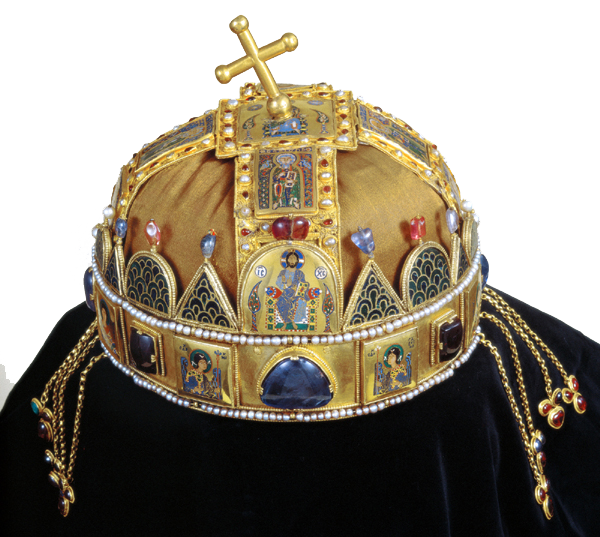
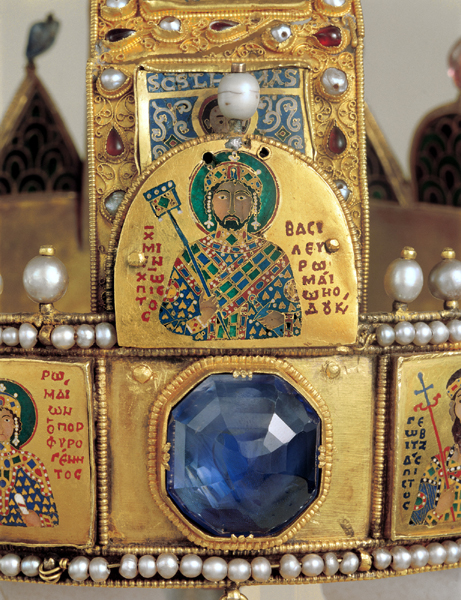
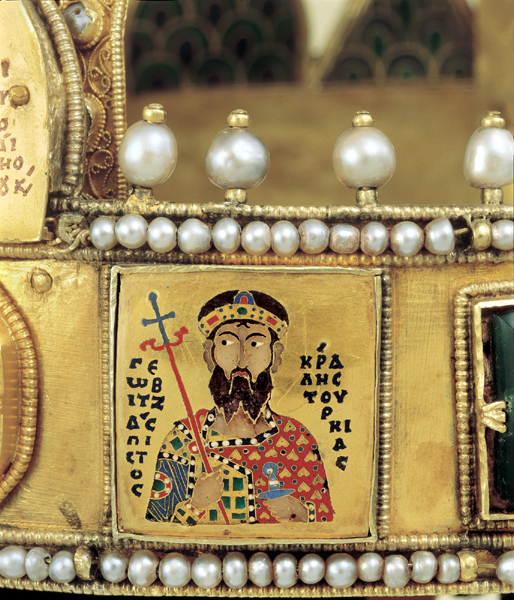
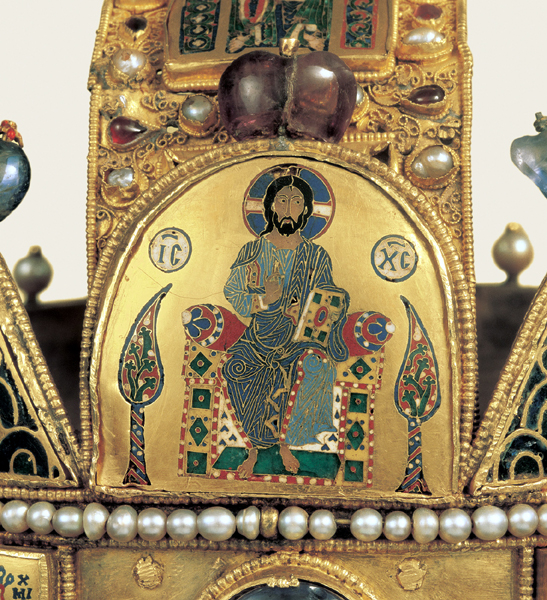
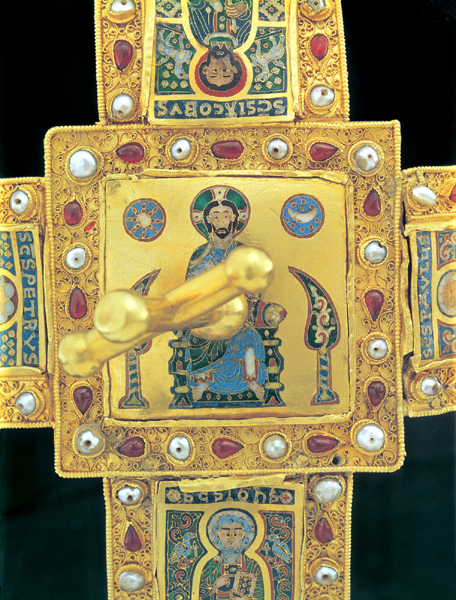
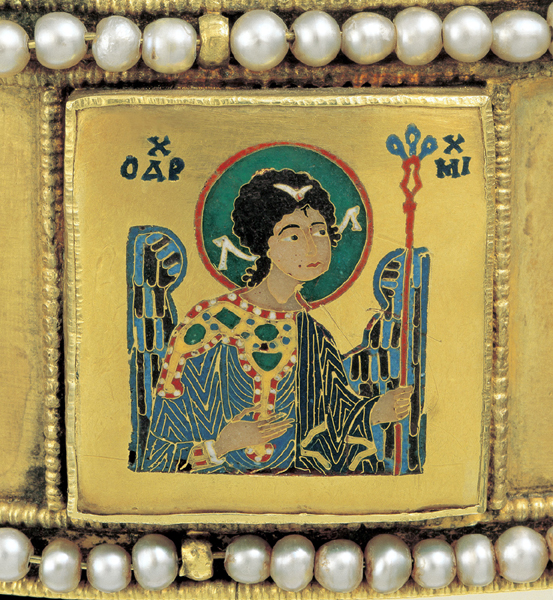
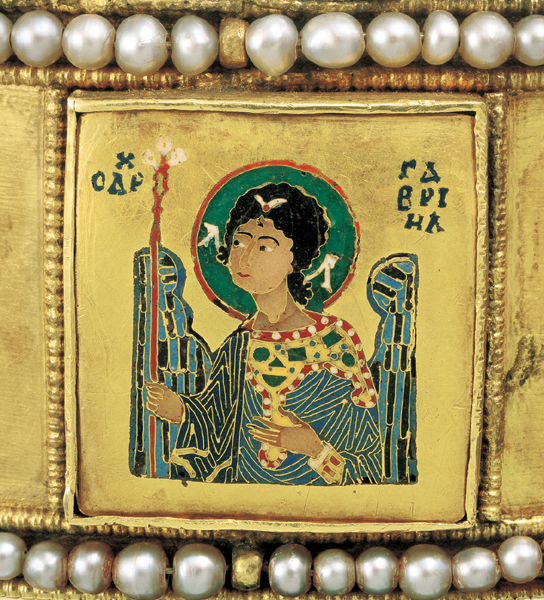
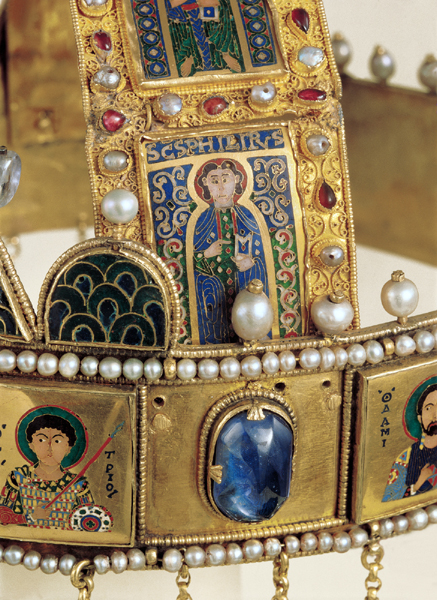
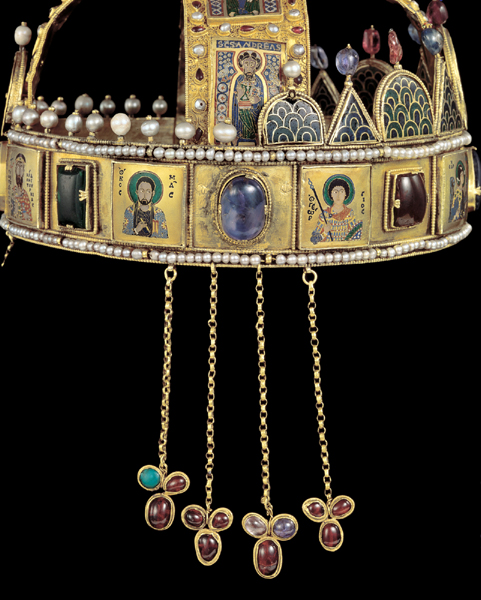
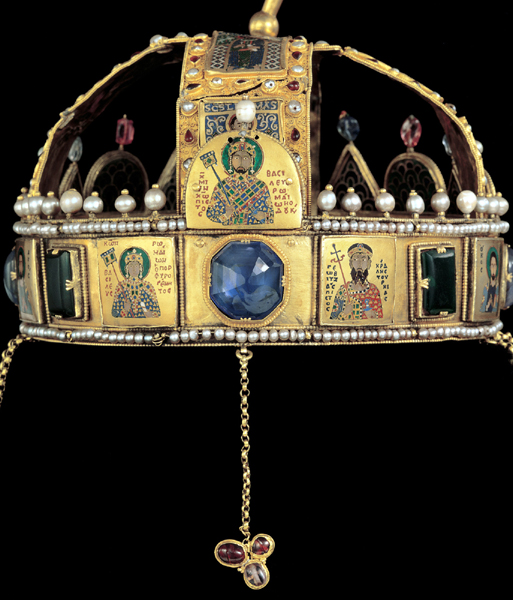
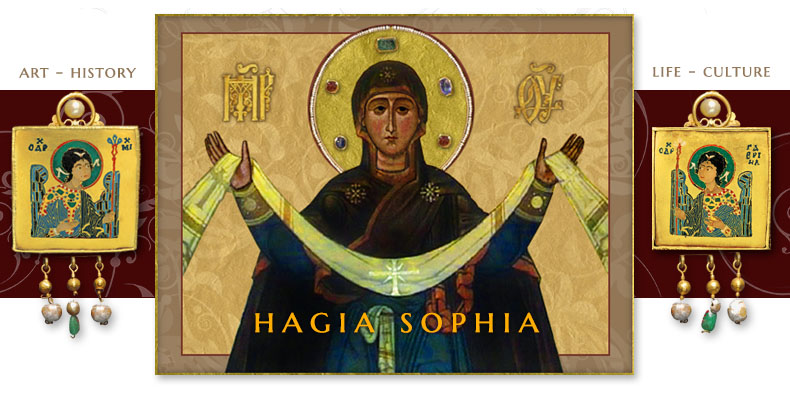

 Thus it was that Constantine's fair city, the common delight and boast of all nations, was laid waste by fire and blackened by soot, taken and emptied of all wealth, public and private, as well as that which was consecrated to God by the scattered nations of the West. Feeble and unspeakable, these assembled to undertake a voyage of piracy, and their pretext to backwater against us, like a painted mask concealing their true motives, was to avenge Isaakios Angelos; as their best and most precious cargo they carried the son he had unfortunately begotten to the ruin of our country. The supine and stay-at-home ministers of the Roman empire ushered in the pirates as judges to condemn and punish us.
Thus it was that Constantine's fair city, the common delight and boast of all nations, was laid waste by fire and blackened by soot, taken and emptied of all wealth, public and private, as well as that which was consecrated to God by the scattered nations of the West. Feeble and unspeakable, these assembled to undertake a voyage of piracy, and their pretext to backwater against us, like a painted mask concealing their true motives, was to avenge Isaakios Angelos; as their best and most precious cargo they carried the son he had unfortunately begotten to the ruin of our country. The supine and stay-at-home ministers of the Roman empire ushered in the pirates as judges to condemn and punish us. As we came to the Church of the Noble Martyr Mokios, a lecherous and unholy barbarian, like a wolf pursuing a lamb, snatched from our midst a fair-tressed maiden, the young daughter of a judge. Before this most piteous spectacle our entire company shouted out in alarm. The girl's father, afflicted by old age and sickness, stumbled, fell into a mud- hole, and lay on his side wailing and wallowing in the mire; turning to me in utter helplessness and calling me by name, he entreated that I do everything possible to free his daughter. I immediately turned back and set out after the abductor, following his tracks; in tears I cried out against the abduction, and with gestures of supplication I prevailed upon those passing troops who were not wholly ignorant of our language to come to my aid, and I even held on to some with my hand. In this way I succeeded in moving some to pity and convinced them to go in pursuit of that shameless fleshpot.
As we came to the Church of the Noble Martyr Mokios, a lecherous and unholy barbarian, like a wolf pursuing a lamb, snatched from our midst a fair-tressed maiden, the young daughter of a judge. Before this most piteous spectacle our entire company shouted out in alarm. The girl's father, afflicted by old age and sickness, stumbled, fell into a mud- hole, and lay on his side wailing and wallowing in the mire; turning to me in utter helplessness and calling me by name, he entreated that I do everything possible to free his daughter. I immediately turned back and set out after the abductor, following his tracks; in tears I cried out against the abduction, and with gestures of supplication I prevailed upon those passing troops who were not wholly ignorant of our language to come to my aid, and I even held on to some with my hand. In this way I succeeded in moving some to pity and convinced them to go in pursuit of that shameless fleshpot. When it was time to anoint an emperor, they assembled in the Great Church of the Apostles of Christ [9 May 1204], where they deliberated on what should be done. At first, according to an ancestral custom, they considered arranging four chalices in a row, one of which would contain the Bloodless Sacrifice; these would then be given to the priests, who, at the calling of each candidate's name for the throne, would take up one of the cups and bring it to him. He would be selected before the others to whose lot fell the chalice that held the Sacred Body and Blood of Christ. However, it was the opinion of Dandolo, doge of Venice, that the selection should be left to a vote. The five noblest candidates from among the French and Lombard nations were chosen, and likewise five from among the Venetians. The vote of the majority prevailed, and the lot of empire fell to Baldwin, count of Flanders, but it was common knowledge that Dandolo had manipulated the outcome through fraud and deceit.
When it was time to anoint an emperor, they assembled in the Great Church of the Apostles of Christ [9 May 1204], where they deliberated on what should be done. At first, according to an ancestral custom, they considered arranging four chalices in a row, one of which would contain the Bloodless Sacrifice; these would then be given to the priests, who, at the calling of each candidate's name for the throne, would take up one of the cups and bring it to him. He would be selected before the others to whose lot fell the chalice that held the Sacred Body and Blood of Christ. However, it was the opinion of Dandolo, doge of Venice, that the selection should be left to a vote. The five noblest candidates from among the French and Lombard nations were chosen, and likewise five from among the Venetians. The vote of the majority prevailed, and the lot of empire fell to Baldwin, count of Flanders, but it was common knowledge that Dandolo had manipulated the outcome through fraud and deceit.



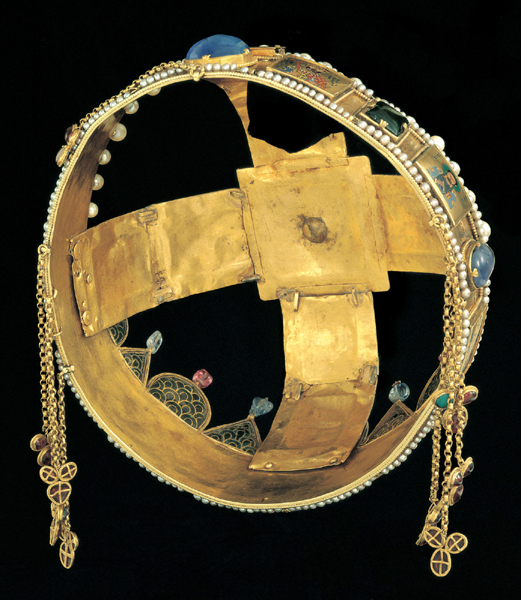
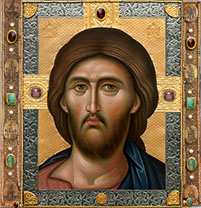 click here for icons of christ
click here for icons of christ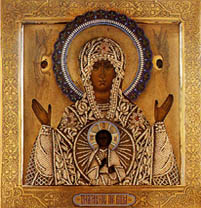 click here for icons of the theotokos
click here for icons of the theotokos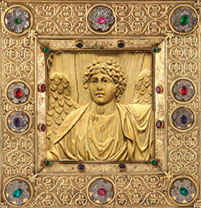 click here for icons of angels
click here for icons of angels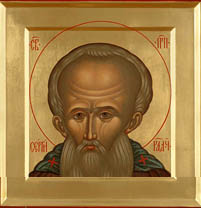 click here for icons of saints
click here for icons of saints








